#like understanding the logical implications of an ‘and’ versus and ‘or’ - then put a ‘not’ in front of it
Explore tagged Tumblr posts
Text
Lewis Carroll and Abstract Algebra -> the intersection of literature and Math
#I think it’s abstract algebra#or was it discrete mathematics?#I just remember working through Lewis Carroll word problems in a math calss#the way I can understand my homeowner insurance policy because of this class#like understanding the logical implications of an ‘and’ versus and ‘or’ - then put a ‘not’ in front of it
8 notes
·
View notes
Note
Personally I don't see what you see in Geordo. He seems like such a scumbag to me and is the least likable charater in the whole series. He is always trying to get her alone to push her into things of a sexual/ more romantic nature without taking how she really feels into consideration. Like he "really wants her" and thats enough for him without caring what she really wants. Honestly he is the borderline non-con villian in my mind.
I mean, it's okay if you feel like that. To each their own.
Hmmm when I think about Geordo being sexually aggressive towards Katarina, I only really just think of the anime. The manga is a much more moe-fied and toned down version of the novels, and the novels does an okay job at balancing his desires for Katarina in all aspects. I'm not saying he doesn't have that trait in the other two mediums, I just think that they aren't as intense as the anime, so as someone who consumes all three versions I just tilt my head and go "huh." Of course I'm sure there are people who read the manga and novels that still feel uncomfortable about his behavior and that's valid too.
-> light novel spoilers ahead <-
tldr, there is a lot more going on to him than just someone who offers sweet words and questionable invitations to Katarina's ears, this may not be noticeable or acceptable to some people but we get to know more about how he thinks whenever the novels puts us in his point of view. You're free to dislike him as much as you want, but I like him & don't see him as a scumbag; and here's why:
I at least find it okay that Geordo is very serious about his pursuits for her because he is aware that she is dense and will not get it until you spell it in the sky. Everyone is just walking eggshells around Katarina hoping that the girl would just develop feelings for one of them to win the harem olympics. He knows that being dealt with a good card isn't enough, so he's actively taking action in order to win her heart. I mean I don't always agree with his methods either, like the "fait accompli" line or constantly inviting her to his room alone, but really, how much of that is something he really means to do vs how much of that is his excessive flirting + our minds assuming that he really means to claim her in that way?
Lines like that are really popular with japanese fans because it makes Geordo look "sexy" and "forward", which they enjoy in their fictional stories. He knows that his position gives him an advantage so he'll try to play his cards right and use it to increase his chances in victory.
It actually reminds me of a scene from the Hamefura StoryMe game, (don't really know how canon it is but I remember the JP ver. was advertised by @/hamhura) where Geordo indirectly asked Katarina how to woo a girl he really likes, and Katarina thinking he was referring to Maria, gives all the things he usually does in order to win her heart (visit her home, give her gift, dance with her in parties, be really forward about your feelings etc). I'm not saying Katarina approves of the ways Geordo attempts to win her heart, but there's some hilarity in knowing that Geordo already had and is constantly trying all the known ways to win over a girl in the world from a young age, and still has nothing to show for it. Like no awareness, much less any *feelings* lmao. So trying to make it obvious that he is interested in her romantically and sexually seems like the next logical step to him. I mean if you go by Geordo's logic and considering the time period this takes place in, he's pretty confident that he can get Katarina to love him back and they are engaged anyways so in his head he's in safe waters to attempt to make teases about such advancements if it gives him the smallest chance that Katarina would become at least aware of him through it.
Of course I know that stuff like that won't fly here in the real world, but maybe that's why I'm so lenient personally when it comes to his (debatably) sexual teases and advances, because it's a fictional story for a japanese audience. Doesn't mean I would approve any advances like that if it happens to me, it's just that it's hard to take his actions seriously when Katarina or the story doesn't take them seriously. Like, the girl would be pushed down to a bed by RufuSora and gives her a hickey and she still thinks the man is out for her blood.
He wouldn't even be entirely wrong, knowing the identities of the characters who Katarina knows has romantic interest in her in the novels, actions does speak louder than words when it comes to her. Like I said, whether or not Geordo really means what he says when the story teases the readers with sexual implications in his words and action depends on the reader in my opinion. They are there, I wont pretend they don't but I'd argue about the level of intent depending on what scene you're talking about.
The only scenes on the top of my head where he is very abrasive towards Katarina is the "fait accompli" scene, the Book scene form the anime (S1 EP8), saying he wants to lock her in his room (LN6) and the multiple times Geordo had invited her in his room at night alone (LN6 and LN8, i think).
I've already explained why I am okay with both Keith and Geordo's Book scenes from episode 8 of the first season because they are accurate representations of an exaggerated and unhinged versions of their desires towards Katarina so I won't bore you with those details again.
He mentioned in Volume 6 that he wants to lock Katarina in his room forever and keep her light to himself, which alarmed a few people when the book came out, but he said that in a moment where he feels super grateful and loving towards her because she knew how tired he was despite his fake face and without even saying anything. It was a moment where he felt so infatuated towards her that he wished the moment where he gets to rest in her arms would last forever, thus he made such a comment. I make it sound more dramatic than it was in Volume 6, it was just a quick comment honestly lmao.
For people who don't read the novels, that last part looks very sus and raises a few red flags I know, but to be fair we can't definitively say what his intentions are because Katarina never commits to those visits. Katarina has actually become wary of those invitations, because Keith and Mary have warned her that Geordo's intentions are sexual, but I'm not really trusting the word of the two people who are most distrustful and antagonistic to Geordo. They could be right, of course, but who can really say? We assume that they are correct because they care about Katarina and are wary of Geordo, but hamefura('s novels) is full of unreliable narrators anyways, it's not like Keith or Mary would consider the possibility of it being anything else because when it comes to the third prince they always fear the worst case scenario.
If you think about it, Geordo is probably aware that winning her over with a "fait accompli" won't work at all because it'll put him in a position that will make other people push him for the throne (which he doesn't want) or could ruin his reputation in high society if Katarina or her family react to it negatively. I'm not Geordo though, so I can't really say if he even have such fears and doubts in the first place, that's just my assessment based on the obstacles he has. On the outside he is really sure of himself and confident (which he arguably deserves) and on the inside he is very careful and insecure when it comes to Katarina.
Also like, spoilers but for someone who is very forward when it comes to his physical advances, Geordo is super weak when he is in the receiving end of those touches. He gets super embarrassed and easily flustered when its Katarina who is touching him, as if implying that to some extent that he's all just talk lmao.
I don't really agree that Geordo doesn't care about what Katarina feels at all, in fact his inner dilemma in the novels is that he doesn't know what to do because in every step he takes he might do something that could ruin his image in Katarina's eyes, be it pursuing or abandoning the throne or looking like a monster in front of her. He even halts his plans to make advances towards her during the Keith Kidnapping Arc, but threw it away because he knows how much finding Keith means to Katarina. He puts what Katarina want and doesn't want as his priority, so when what she feels is unclear that's when he acts on his own intuition. The only reason Geordo feels so confident to advance towards her sexually is because Katarina never rejected him before (because she doesn't know what they mean, and all of this is for the sake of simply making her aware in the first place)
I'm not trying to make anyone think that one has to read all the books in order to understand him, I think the manga does okay at conveying his feelings too. The anime really prioritizes on making him look "sexy" for the japanese female audience, so anything he does is sprinkled with spice whether we like it or not.
I'm sorry if it seems like I'm overanalyzing all his actions just to justify them, everyone has the right to be uncomfortable with his advances if it seems too much for you. It's just that his actions, while over the top and unnecessary, are done to please the type of audience that hamefura caters to, and it's hard to take him completely seriously when the story doesn't either in my opinion. Doesn't mean he's right or that any of it is okay, but it's his method of trying to put a dent on Katarina's bakashield. When you're in a race versus your friends who Katarina all loves equally, he's gonna use whatever card he can get in order to win.
I like Geordo; I like how much of his feelings for Katarina forces him to reexamine himself and realize that he isn't a perfect prince at all, that he has lots of problems and flaws that he needs to work out in order to be someone worthy of her. I like the way he falls more and more in love with her in every interaction they have because he finally gets to have a genuinely and caring interaction with someone. I like how Geordo wants to do better and be better for Katarina and the people around him, and he wants to be able to thank Katarina directly for that through being able to show his love. I like that despite how much of a chad he acts in front of her, he's a blushing mess at the thought of Katarina returning his feelings. I find it funny when his "sexual advances" fails and gets thwarted because he's trying them on the densest person and most protected lady to ever live. I like how Geordo is so head-over-heals in love with her and how much comfort and warmth she brings to him by simply being her caring and bubbly self.
I guess it's just a matter of different perspectives. If you find him unlikeable or a villain, then you do you. I try to explain why I personally excuse his actions, but I know it wont fly with everyone. We all see each character differently and absorb the material in different ways. In fact it's probably a bad idea for me to defend him with material that isn't the anime nor manga yet lmao. I mean I'm not that much of a fan of Mary anymore, and I'm kinda scared and wary of her, but I know people don't see her the way I do and I'm okay with that.
Maybe its just me, who is the kind of person who just goes with the flow and doesn't think too hard because it's all fiction anyways
It's hard to tell all this from simply watching the anime, so I laid all my feelings down in hopes that someone out there would understand why I like him so much.
Thank you for the ask, you can ask more questions or call me out if I said anything insensitive or wrong, I know a lot of this is me overanalyzing things which might look like I'm jus stretching. As someone who is aware of the things to come in Hamefura X, I can say that I am both excited and nervous as to how everyone will react for the direction of Geordo's character.
#mh ask#hamefura#my next life as a villainess#geordo stuart#katarina claes#geokata#for some reason tumblr wont type the letter E#anyways there are my thoughts please dont hate me lmao#if you dont like Geordo then thats fine#im not forcing anyone to like him#i just wanna explain my own perspective thats all#DONT THROW FIRE AT ME#bakarina#destruction flag otome#hamehura#hamefura spoilers
89 notes
·
View notes
Text
This may be a hot take, and this is just my opinion so feel free to disagree, but I don’t really think Crosshair cares much about the Empire as an entity in and of itself. He doesn’t care about their agenda or how they choose to do things. I think right now he doesn’t care whether following the Empire is a good thing to do or the right thing to do, I think he’s doing it because he thinks it’s what he’s supposed to do. Which is wrong, obviously, and a horrible way to be making decisions about a fascist regime like the Empire, but I think mentally that’s where he’s at.
I believe a lot of the conflict we see him experience in episode 16 is between doing what he wants to do versus doing what he thinks he’s supposed to do. It’s obvious from the look on his face as they leave again that Crosshair still wants to be with his brothers, but like Hunter said, they want different things. Crosshair wants to be with his brothers, but he wants them to be with him as soldiers of the Empire because he believes that is their sole purpose. He even tells Hunter in his weird Imperial sales pitch: “We can have purpose again.”
Think about it, the clones were raised to believe they were created for one purpose: to be soldiers. They were “programmed,” as Cut and Fives would say, to believe their only reason for existing was to fight and die for the Republic. Even Clone Force 99. How many times throughout The Clone Wars did we hear clones talk about “doing their duty?” I think Crosshair believes now that the Republic is gone and the Empire is taking over, his purpose is to serve the Empire. Like Echo said, “we’re soldiers. What other purpose is there?” He’s not thinking morally, he’s not thinking about whether what the Empire is doing is right or wrong, he’s just following orders. Because good soldiers follow orders. It’s the same journey we’ve seen clones like Rex and Fives go through (albeit this time with significantly higher moral implications because of the Empire) about blindly following orders versus doing what’s right regardless of orders. Like Hunter says, “blindly following orders makes you a pawn.” Crosshair has yet to learn that lesson.
Meanwhile, the Bad Batch just spent the entirety of season 1 learning that there is a purpose for them outside of being soldiers. That being a soldier and fighting and dying in a war is not the only thing they can do. In addition, arguably the entirety of season one is about Hunter and the Bad Batch learning to do things simply because it’s the right thing to do. Omega has taught them again and again to do something because it’s the right thing to do, versus whether it’s the objectively logical thing to do. Helping Rex, saving Cid, helping Hera, saving the Syndullas, defending Roland from the Pykes. The Bad Batch were hesitant to do all these things because it was “too risky” or it wasn’t their place or it wasn’t the “strategic” move. But Omega taught them otherwise. So far The Bad Batch has been able to learn these lessons to an extent, but Crosshair hasn’t because he hasn’t been with them.
I think that was ultimately the point of the chip activating in the first episode. It only happened as a plot vehicle to separate Crosshair from everyone else. Once it set Crosshair and the Bad Batch apart from one another, it became obsolete. That’s why they could remove it vaguely off screen and it wouldn’t matter. It was only meant to send them on different paths which were going to lead to different experiences, lessons, and decisions, that then placed everyone where they were by the end of the finale.
Now don’t misinterpret this, I am not defending Crosshair. He’s still very much in the wrong. Besides saving Omega and AZI in the finale, pretty much every time he’s been given a choice to do something this season, he’s made the wrong one. And I don’t agree with him or what he’s saying. I’m just trying to understand his logic. I’m trying understand how his character went from “I’m doing this because this thing in my head is making me” — which we know he was under the influence of the inhibitor chip in, at the very least, the first episode — to “I’m doing this because this is what I want/I am choosing to do.” And why, despite doing what he thinks he’s supposed to be doing, the man still looks utterly conflicted about it whenever we see him without his helmet. Crosshair needs to start thinking and make decisions based on morality and not blind allegiance in order to begin his journey to redemption.
(Also shout out to @luminousbeingsarewe and @annpank for your replies on my last analysis for helping me finally be able to put words to my thoughts on this!)
#back at it again with the character analysis#can you tell I’m trained to analyze human behavior lmao#knew those degrees would come in handy some day#long post#character analysis#tbb#tbb spoilers#the bad batch#the bad batch spoilers#tbb crosshair#crosshair#commander crosshair#tbb hunter#tbb omega#Star Wars#idk i just think he's neat
53 notes
·
View notes
Text
Episode 5
Previous Episode | Next Episode
(Spoilers for the whole show ahead!)
Episode 5 is chock full of moments and fun romantic tropes that make it hard to believe this show passed the censorship.
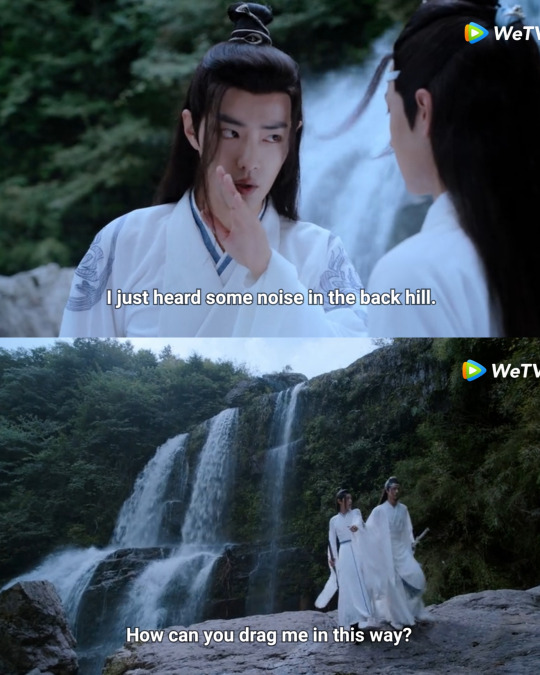
Wei Ying has already taken Lan Zhan as his soulmate of many lifetimes and started confiding secrets in him. He gets dragged away to copy all the rules he broke but it’s ok Wei Ying, Lan Zhan has to notice the undeniable chemistry you share at some point.
The Yiling Patriarch Invented Gay Pining

The sheer amount of pining in this scene.. How did he not burn a hole through the library?

Guy takes a break from admiring the beauty of his crush, starts admiring his calligraphy instead.
The Many Names Wei Ying Calls Him
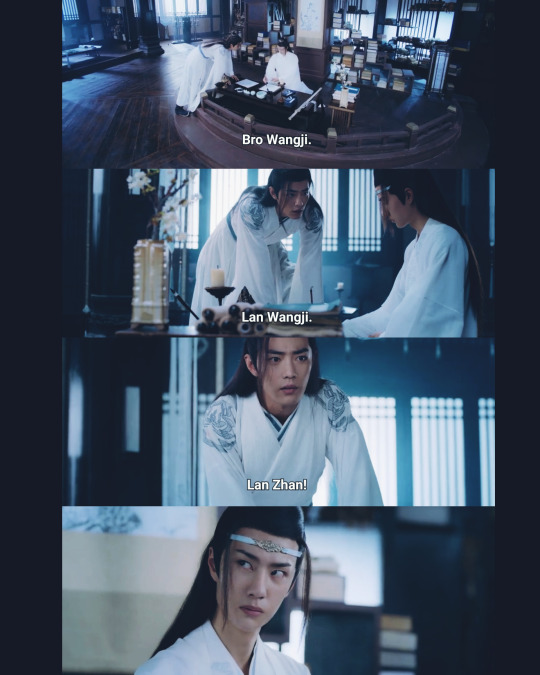
Calling your beloved by his every name to get his attention. Success! He responds to the name with intimate connotations. But oh no! He actually looked at you! What do you do now? Head empty. Quick! Ask him why he’s ignoring you and subtly remind him that he has the right to express his anger by using your formal name for completely logical reasons.
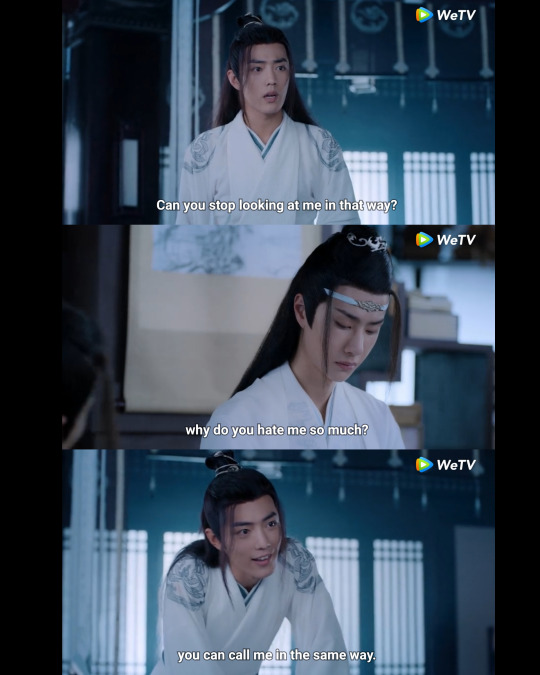
I understand Wei Ying's feelings, it must be maddening to meet the love of your life and want to skip to the domestic stages of romance, when he still considers you an unruly stranger who has no business with him.

Can we take a second to appreciate what a pure soul Wei Ying is for wanting to constantly do better and learn what he did for Lan Zhan to hate him so much? He apologizes not once but repeatedly for breaking the rules and assures Lan Zhan he would never attack him with the intention to harm. (Wei Ying sweetie, you did nothing wrong, he just isn't ready to admit you're melting his heart.)
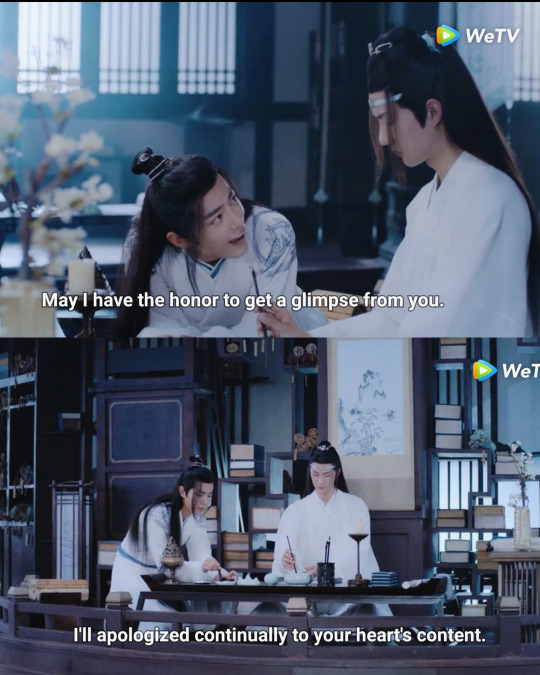
All he wants is your attention. Just spare him some him, Lan Zhan! I have no clue how someone can say no to Wei Ying when he’s being this cute. Lan Zhan’s self-restraint must really be something else.
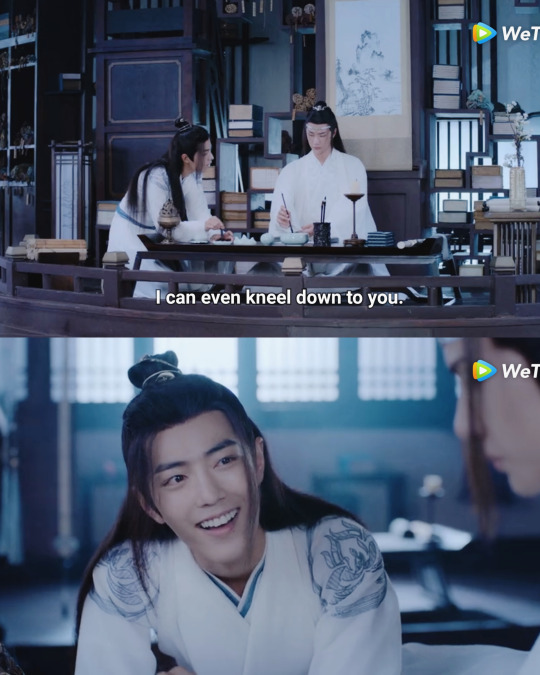
This line and Wei Ying's gay ass smile is so damning. I do not know how some Chinese censor officials did not have conniptions over this.. were they too blinded by heteronormativity, perhaps? Even Lan Zhan has had enough and charms him into silence.
Looking At Him When He’s Not Looking
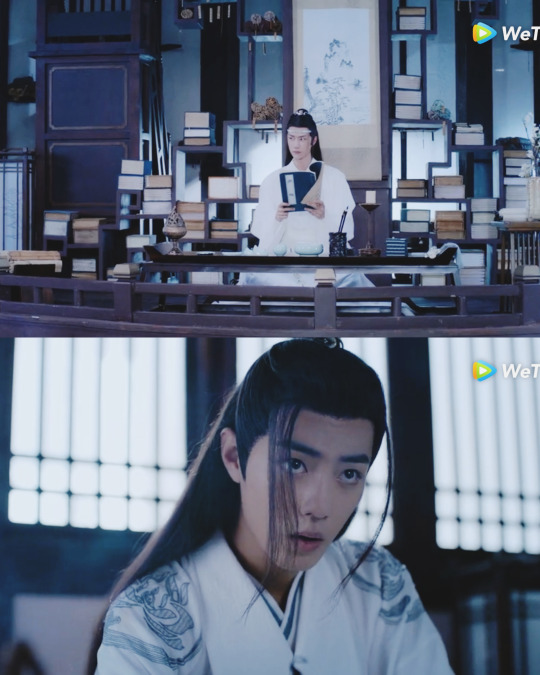
Looking at your bro when you think he isn't aware you're looking at him, but he's actually painting a portrait of you when you aren't looking at him. I’m done with these idiots.
Wei Ying's heartfelt apology is obvious to us but Lan Zhan's definition of sincerity is abiding by the rules, which Wei Ying gives into for him, with a lot of effort. If that’s not love, what is?
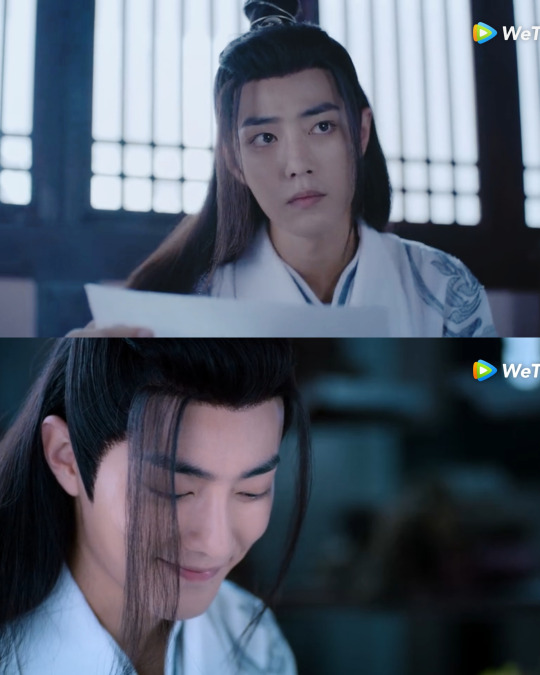
More pining. Wei Ying makes one last attempt at wooing Lan Zhan for the day by giving him a parting gift. (For what exactly? Monitoring him while he carried out his punishment? Love is so irrational, y’all.)
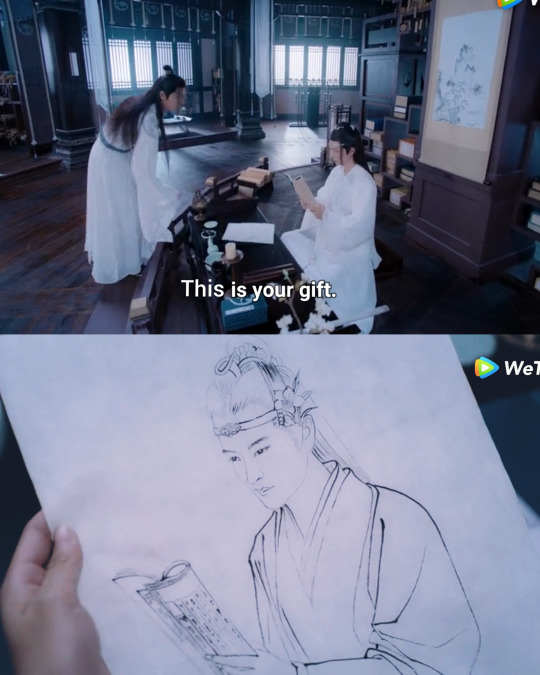
The last touch he gives to Lan Zhan's portrait is adding a flower to his forehead ribbon. This is how Wei Ying really sees Lan Zhan - not as the intimidating Lan Wangji from Gusu Lan clan, but the guy he finds cute when he's lost in concentration. It pains me to see Wei Ying do so much to win his heart.
Lan Zhan Thinks Everything Wei Ying Does Is “Boring”

Wei Ying asks him to say something other than “boring” for a change and this is his reply. What makes their relationship so captivating is their contrasting personalities. Every time Lan Zhan thinks Wei Ying is being ridiculous and goes, “Boring,” I think he actually finds Wei Ying kind of amazing and that’s annoying because it is nothing but a hindrance to the way of life expected from him. It is boring and ridiculous to Lan Zhan that he is starting to get used to Wei Ying’s presence in his life. It is boring that he’s beginning to notice and personally care for a single person instead of the world. It is boring how someone is breaking the seamless silence Lan Zhan has spent most his life wrapped up in and suddenly making it overflow with words - words he does not vocalize but Wei Ying hears anyway. That’s what finding the right person feels like, after all. So it is boring that Wei Ying, with his stupid grin, is so close to coming into his life, throwing out the worldly matters Lan Zhan is supposed to be devoted to and asking him, “Lan Zhan, isn’t it funny that I’m your worldly matter now?”

I guess Wei Ying does get his wish in the end. Lan Zhan erupts and calls him "Wei Ying" for the first time ever because he made him open an erotic book, more specifically one that features explicit gay art. The production team is so slick, I felt giddy the first time I saw this. But still, I don’t think Lan Zhan was being fair, I’m sure he broke a rule that said it’s a great offense to reject someone’s gift.

Lan Zhan strikes me as a closeted baby gay raised on ascetic principles, and Wei Ying’s confident chaotic bi energy is predictably sending his poor world for a toss. No wonder he was ready to duel it out with him. What are the implications of this, Wei Ying? You showed a Lan clan member gay erotic art and assured him there is absolutely nothing wrong in enjoying it. Do you want to kill him?
And remember Wei Ying got this book from Nie Huaisang who has also been queer-coded. After a point, you lose sight of how many characters seem hella gay on this show.
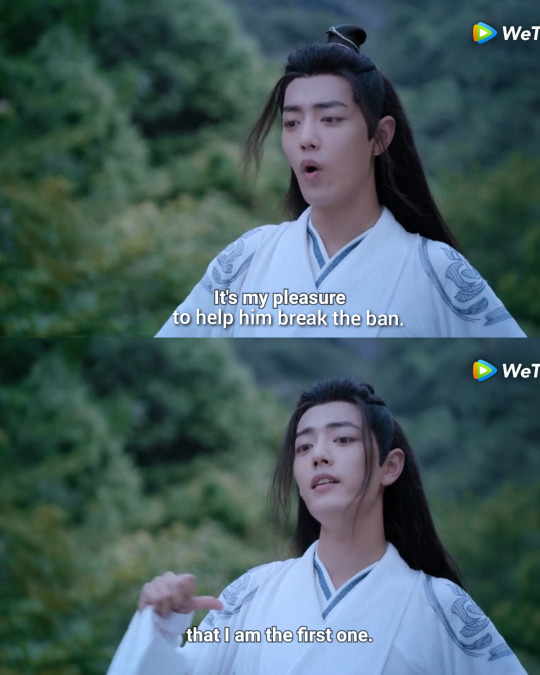
Nonetheless, it is impressive that there is someone who can make the disciplined, detached Hanguang-Jun lose his calm and even get him to swear. Of course it ends up being something for Wei Ying to brag about later. It is indeed an accomplishment that few people can claim as their own.
Can We Buy An Island For Our President Zewu Jun?

Zewu Jun is not even being subtle here. Why is he smiling? Seriously, why?! The fact that his brother called this guy by his formal name which can be used only by people you're close to? The fact that he followed Wei Ying to the secluded part of the Cloud Recesses? Or because he was unable to find the real person since he's fixated on Wei Ying? Knowing our President, it's probably all of the above.
The show's clever usage of Zewu Jun as the emotional compass who points precisely to what Lan Zhan feels is definitely one of my favorite things. We see that Lan Zhan often says one thing about Wei Ying but means another and Zewu Jun is the stand-in for the audience who knows the truth.
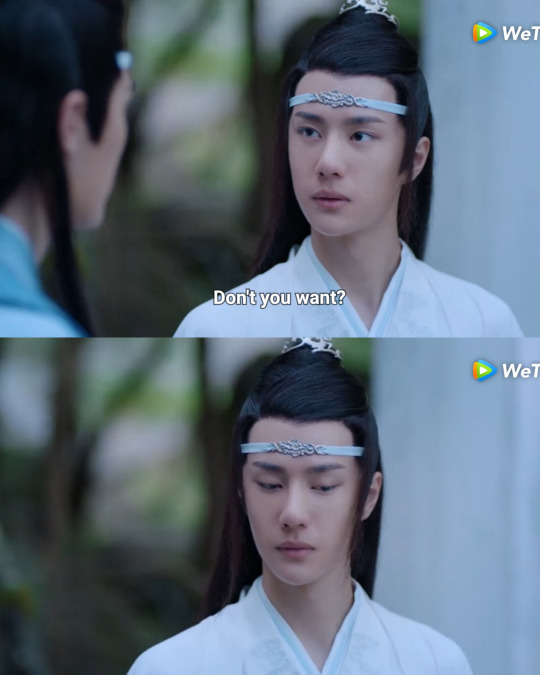
We can see the contrast of a speechless Lan Zhan when Zewu Jun confronts him about wanting Wei Ying's company versus the facade he puts on when actually in Wei Ying's company. That's it for today's analysis, folks.
The Aqua Demon Hunt Is The First Testament To Their Chemistry
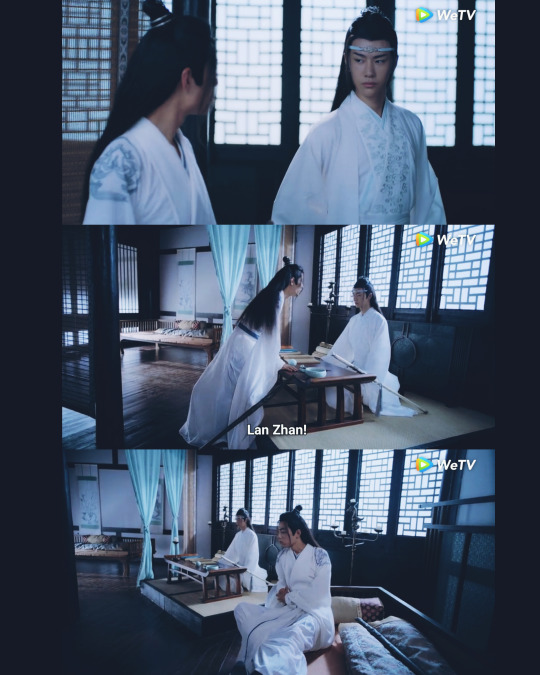
Wangxian end up sharing a room. (Do we have the President to thank for that?) Lan Zhan being all "Time for me to go meditate in solitude" and Wei Ying being ".... about how we belong together!"
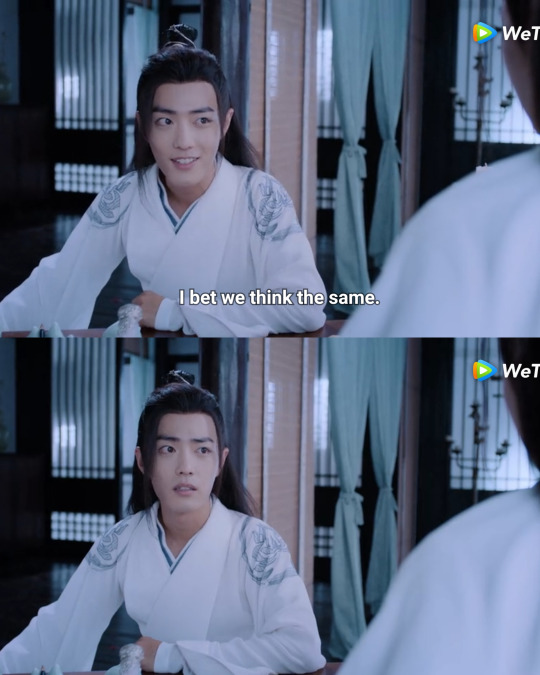
Rewatching these scenes is definitely bad for my heart. The unconcealed disappointment on Wei Ying's face when Lan Zhan turns down his bet to prove their like-mindedness really sends. (Is this the ancient equivalent of a love calculator, Wei Ying? How did the Yiling Patriarch never invent a device like that, I wonder.)
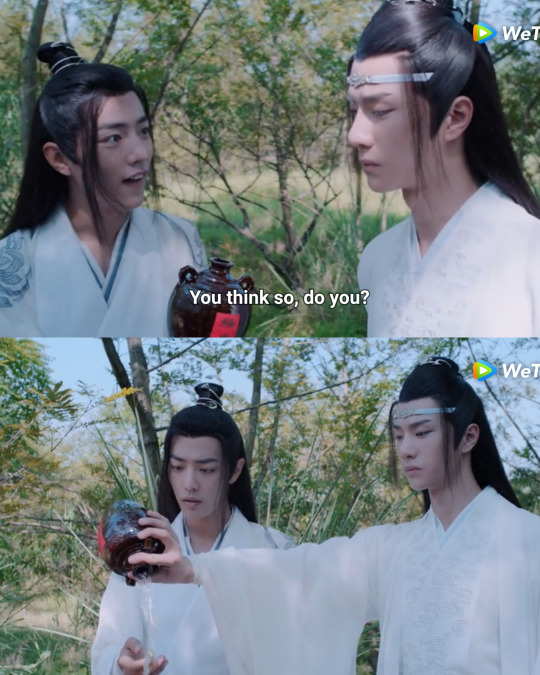
Lan Zhan, did he really deserve this? He just wants to show you what an incredible, unmatchable team you both will make! And he is so good at reading your mind.

Just smiling at the fact that your bro exists for no apparent reason in middle of a hunt. Wei Ying sure has his priorities straight, even if nothing else in his life is.
Wangxian Are The Dream Team
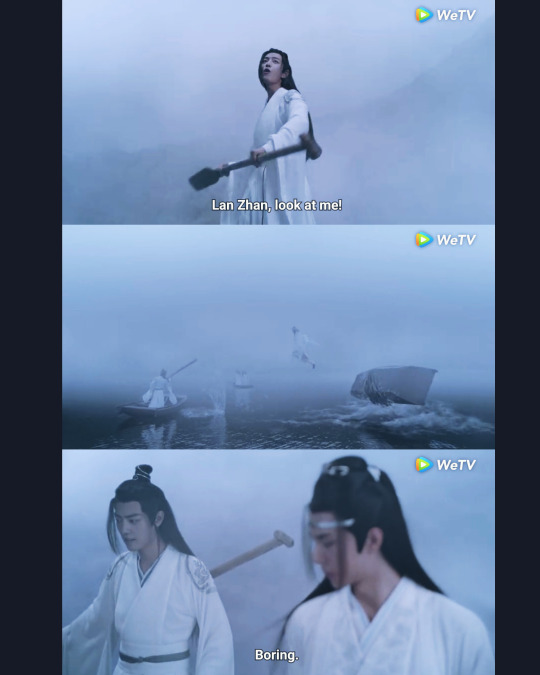
Wei Ying distracting the water ghost and saving Lan Zhan at the same time so effortlessly? A stroke of admirable genius! I probably need to start a separate post to keep track of all the times Wangxian's teamwork puts everyone else to shame. Notice how every time Lan Zhan said "boring" in this episode, it was directed only at Wei Ying’s romantic gestures.
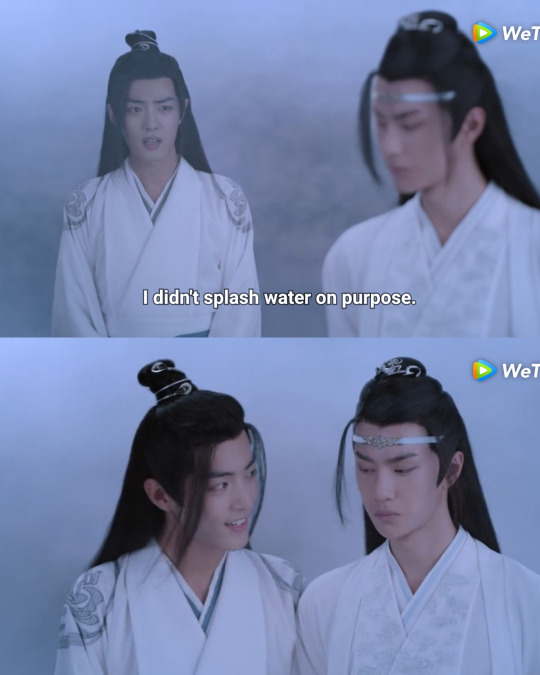
It's that little shoulder bump that screams "I'm sorry I splashed water at you, I did out of my love for you, okay?"
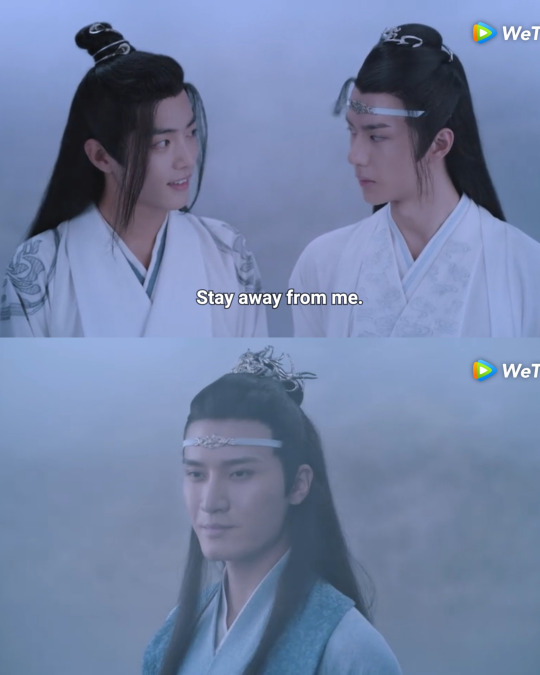
I'm sorry Wei Ying, he just needs more time to process the fact that you are the unrivalled candidate for a cultivation partner he has ever come across. And if you ever get confused why Zewu Jun is mysteriously smiling at various points in the show, it's probably a "My brother is falling in love, good for him, good for him" smile.
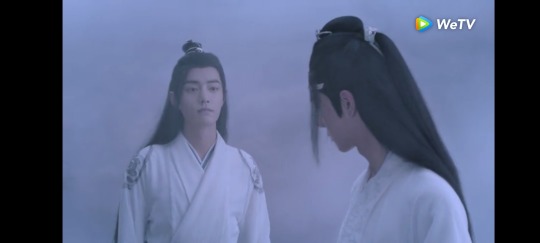
Wei Ying’s little head tilt after they both defeat the water ghost that came for their boat that says, “See? We belong together.”
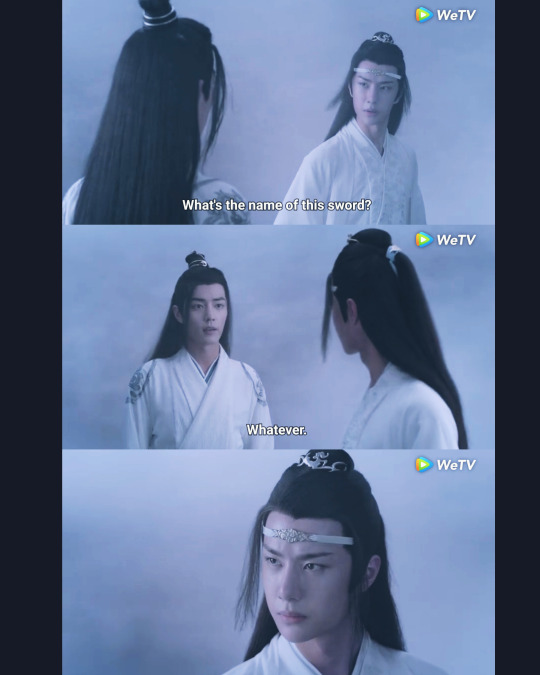
When Lan Zhan learns why Suibian is called so and thinks, "My crush is a fucking idiot, love that for me.“
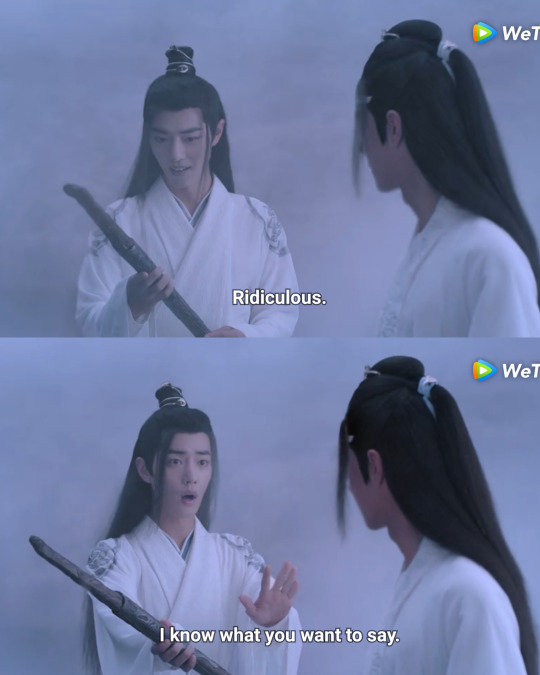
Wei Ying always understands what Lan Zhan is thinking or wants to say without him having said a word. Soulmates.

Thank you water ghosts for ensuring they both end up on the same boat and giving them the chance to display their spectacular synchronization. Maybe it’ll help Lan Zhan wake up.
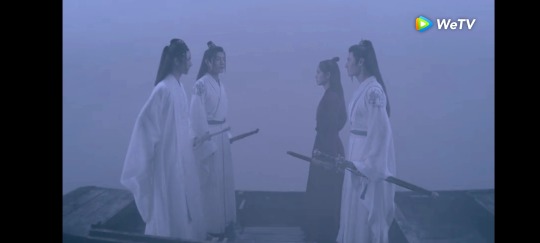
I rejoice every time there is a juxtaposition of Wangxian with the straight couples because it proves our main characters are travelling the same romantic arc the others are.
Saving Him For The First Time
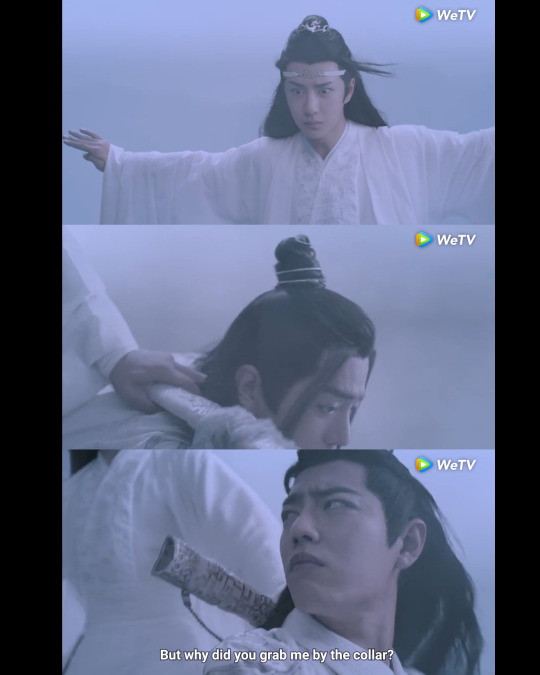
Lan Zhan rescues Wei Ying in the nick of time! Sure, that’s the Right Thing to do but do you see his expression? That’s unbridled shock that Wei Ying is going to die. And the matter of utmost importance to Wei Ying in this life-or-death situation is the fact that Lan Zhan isn't holding his hand after the "intimate" experiences they’ve shared. I cannot.

Ok Lan Zhan.. You don't touch people.. Let’s see who the exception is. But honestly we get it, just swooping in to save him was a lot to handle, holding his hand would have been a gay apocalypse on your heart.
Wei Ying Is Growing On Lan Zhan

Lan Zhan finally admits Wei Ying could be right, because annoying as he is, his deductions are brilliant.
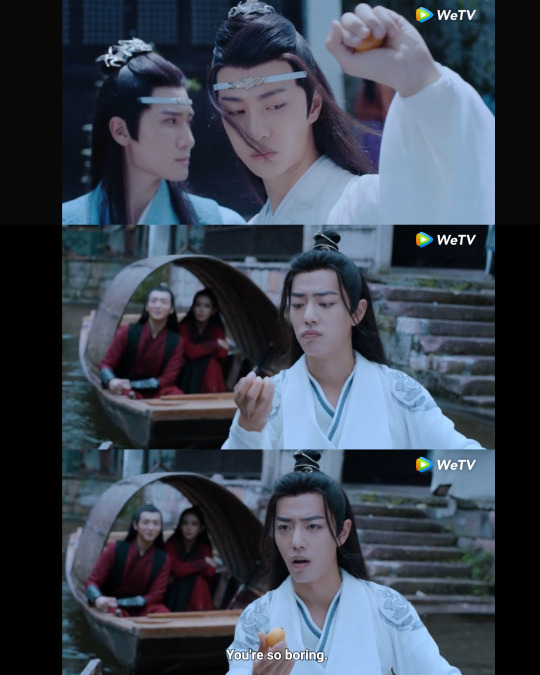
We learn Lan Zhan is secretly craving loqauts but throws it back when Wei Ying gives him one. Zewu Jun offers to buy loquats for Lan Zhan, again hinting at his repressed feelings for Wei Ying.
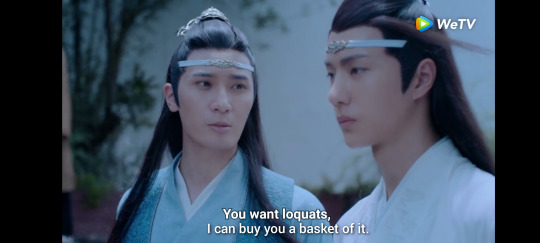
When we hear a vendor selling Emperor's Smile, do we see Lan Zhan's anti-Wei Ying persona begin to crack or am I seeing things?

The episode ends with someone (Wei Ying) taking two bottles of Emperor's Smile and paying for it. Whatever happens, Wei Ying is going to sneak his misconduct into the Cloud Recesses and his way into Lan Zhan’s unfaltering heart.

All in all, this was an episode that opened the possibility of Lan Zhan maybe starting to accept that Wei Ying is a nuisance he likes having around. At the very least, he wants to live in a world where Wei Ying is alive and being his unbelievable self. He’s a man of few words and many micro expressions so that’s why it’s so golden on the rare occasions he does slip up and show that he cares about Wei Ying, like saving him in this episode. His actions speak louder than his words, and they ring louder still as show progresses and he becomes the main line of defense between Wei Ying and anyone who so much as thinks about harming him.
Episode 5 drives it home that Wangxian have chemistry that is to be envied and worth investing in. We get the sense that these two are going to be together for a long ass time.
#the untamed#chen qing ling#cql#mdzs#mo dao zu shi#the untamed analysis#the untamed meta#wangxian analysis#wangxian meta#cql meta#cql episodes#the untamed episodes#wangxian#lan zhan#wei ying#lan wangji#wei wuxian#cql rewatch#the untamed rewatch#mdzs meta
125 notes
·
View notes
Note
"I never knew what he wanted in a woman because I never knew what I wanted" I think this quote is so telling but I haven't seen much commentary on it. Do you have any particular thoughts? It seems to put John in a very sad light. And to me it's one of his most revealingly repressed-gay quotes, but maybe there's another way to interpret & I'm overstepping.
Hello there, dear anon!
I hope you’re still around to see this! As usual, I’ve taken an appalling amount of time answering this thought-provoking ask. However, in this instance, that “appalling amount of time” is probably over a year; a new record for me. Wherever you are now, I hope you are well, and if my ramblings don’t reach you, may they interest others.
I also have to admit that at the time I received this ask, I was most likely not equipped to understand all the layers of meaning in this sentence. And it’d be quite presumptuous of me to assume that I am completely prepared now. But let’s just hope that my ability to perceive their nuances has grown since then, and will continue to do so in the future.
Needless to say, this is only my current interpretation, and I welcome any commentaries that will help broaden it! (And please don’t fret for a second about offering your own interpretation and somehow “overstepping”; we’re all just having a decades-spanning conversation here.)
Now, on with your question.
First, let’s integrate that sentence in its full quote:
Q: So, John. You and Paul were probably the greatest songwriting team in a generation. And you had this huge falling out. Were there always huge differences between you and Paul, or was there a time when you had a lot in common?
JOHN: Well, Paul always wanted the home life, you see. He liked it with daddy and the brother… and obviously missed his mother. […]
JOHN: So it was always the family thing, you see. If Jane [Asher] was to have a career, then that’s not going to be a cozy family, is it? All the other girls were just groupies mainly. And with Linda not only did he have a ready-made family, but she knows what he wants, obviously, and has given it to him. The complete family life. He’s in Scotland. He told me he doesn’t like English cities anymore. So that’s how it is.
Q: So you think with Linda he’s found what he wanted?
JOHN: I guess so. I guess so. I just don’t understand. I never knew what he wanted in a woman because I never knew what I wanted. I knew I wanted something intelligent or something arty. But you don’t really know what you want until you find it. So anyway, I was very surprised with Linda. I wouldn’t have been surprised if he’d married Jane (Asher) because it had been going on for a long time and they went through a whole ordinary love scene. But with Linda it was just like – boom! She was in and that was the end of it.
— John Lennon, interviewed by Peter McCabe and Robert Schonfeld, at St. Regis Hotel, New York City (5 September 1971).
So, the interviewer inquires about their differences and similarities during the relationship, probably to assess the pervasiveness of the clashes that supposedly led to the “huge falling out” in “the greatest songwriting team in a generation.”
And John answers that “Paul always wanted the home life.”
At first glance, and following the logic of what was asked, one might assume John was pointing to a difference that always existed between them. And an irreconcilable difference at that, given that it’s the first thing he points out in answer to a question that is probing for sources of conflict that might explain their falling out.
So we get a feeling that John saw Paul having a family as incompatible with Paul maintaining a partnership with him. They were mutually exclusive; thus, Paul getting a family resulted in a falling out between them.
That right there carries a lot of implications already.
Because John himself also wanted the “complete family life”:
Q: But with that much experience behind you, now, would you like to have more children?
JOHN: Yeah, I – as – as many as come, you know. If Lennon roll out, as they. [thoughtful] I like large families. The idea of it.
— John Lennon, interviewed by Brian Matthew (13 November 1965).
And we shouldn’t take his disappointment with the suburban life in Weybridge as proof that he’d given up on that fantasy. It’s all about the circumstances, in the end; who you’re sharing your dream with.
After all, Yoko herself came with a “ready-made family”: a six-year-old daughter named Kyoko, who she was fighting to get the custody of, after divorcing the father, Anthony Cox, in February 1969; by then John and Yoko would even have a baby of their own.
This would all eventually fall through, as Yoko suffered a miscarriage in late November 1968, and Cox would disappear with Kyoko in 1971. Yoko would not see her daughter again until almost three decades later.
So you could see how John could have felt resentful of the family life Paul had built. Always perfect mirror images, Paul was living the dream, while John’s turned into a nightmare.
But with John, the situation is always doubly complicated. Because if he was often envious of Paul, John was also jealous. Note that “envy is when you want what someone else has, but jealousy is when you’re worried someone’s trying to take what you have.”
So we have to go back to his first answer. We’ve established that wanting��“the complete family life” was something they had in common rather than something they differed in.
But Paul wanting a family is still presented here as a reason for their falling out, or at least tangentially related. And John goes on to present his theory about how Paul’s choice in life partner was based on who could provide that for him. It wouldn’t be the career-focused Jane, or the inconsequential groupies.
And it couldn’t be John himself.
We should also note that, in answer to the second question, it is made clear that John’s previous declarations were but a retrospective interpretation of what happened. As he goes on to admit, at the time, John was surprised by Paul marrying Linda instead of Jane.
And that is how we finally get to the sentence in question:
“I never knew what he wanted in a woman because I never knew what I wanted.”
A possible first layer of meaning is what I’m guessing you meant by this being “one of his most revealingly repressed-gay quotes.”
1. The emphasis being placed on John never knowing what he wanted in a woman, and thus not being able to know what Paul would find more desirable in a wife.
He does go on to use admittedly questionable pronouns: “I knew I wanted something intelligent or something arty.” It happened in other instances in this interview:
I just realized that [Yoko] knew everything I knew, and more, probably, and it was coming out of a woman’s head. It just sort of bowled me over, you know? And it was like finding gold or something. To find somebody that you can go and get pissed with, and have exactly the same relationship as any mate in Liverpool you’d ever had, but also you could go to bed with him, and it could stroke your head when you felt tired, or sick, or depressed. It could also be Mother. And obviously, that’s what the male-female – you know, you could take those roles with each other.
— John Lennon, interviewed by Peter McCabe and Robert Schonfeld, at St. Regis Hotel, New York City (5 September 1971).
So one could see how, at this time, John was struggling to manage the differences between male and female partners. As Cynthia put it:
I think he was trying to find himself a… what he’d call a soulmate. Someone who had as mad ideas as he had. I think he felt that she had the talent… but that’s debatable. But he needed that— he didn’t need a ‘mumsie’ partner at that point. He needed a mate. And I think he actually said, at some stage, in an interview that, you know— She’s the nearest thing to a man — a mate; man — that he’s ever had in a woman.
— Cynthia Lennon, interviewed by Alex Belfield for BBC Radio (2006).
Another angle that I find curious is:
2. The parallel drawn between Linda’s knowledge of Paul’s wants (and her ability to satisfy them) versus John’s.
“[Linda] knows what he wants, obviously, and has given it to him.” / “I never knew what he wanted”
This one integrates a theme I’ve been interested in exploring recently: their epistemology of each other. Basically, assumptions of knowledge; when it works out and when it doesn’t.
1968: I wonder should I call you but I know what you would do
JOHN: Well, [‘How Do You Sleep’]’s an answer, you know? Paul, uh, personally doesn’t feel as though I insulted him or anything. ’Cause I had dinner with him last week, and he was quite happy.
— John Lennon, interviewed by Mike Douglas on The Mike Douglas Show (12 February 1972).
1973: And I know just how you feel / And I know now what I have done / And I know and I’m guilty (yes I am) / But I never could read your mind
In this specific case, he could be humbly admitting he never knew what Paul wanted. But another possible reading of the sentence is the exact opposite:
3. The assumption that they were so connected, so much like a single entity, that to know himself was to know Paul. That their wants and needs are aligned, and what John wants must be what Paul wants.
I never knew what he wanted in a woman because I never knew what I wanted.
1967: I am he / As you are he / As you are me / And we are all together
1969: I know you, you know me
The mirror image of this interpretation would be Paul’s own thought-provoking declarations:
[T]he Beatle thing is over. It has been exploded, partly by what we have done, and partly by other people. We are individuals— all different. John married Yoko, I married Linda. We didn’t marry the same girl.
— Paul McCartney, for Life Magazine (7 November 1969).
Q: Will Paul and Linda become John and Yoko?
PAUL: No, they will become Paul and Linda.
— McCartney press release (9 April 1970).
And finally, I believe another very important facet expressed in this sentence is:
4. The theme of John not knowing what he wants for himself.
I never knew what he wanted in a woman because I never knew what I wanted. […] But you don’t really know what you want until you find it.
This is a sentiment that John has expressed before.
JOHN: Weybridge won’t do at all. I’m just stopping at it […] I think of it every day — me in my Hansel and Gretel house. I’ll take my time; I’ll get my real house when I know what I want. You see there’s something else I’m going to do, something I must do — only I don’t know what it is. That’s why I go round painting and taping and drawing and writing and that, because it may be one of them. All I know is, this isn’t it for me.
— John Lennon, interviewed by Maureen Cleave for the London Evening Standard (4 March 1966).
JOHN: I think, in one way, all of us were under the slight illusion that we might— or maybe it wasn’t an illusion and maybe had we pushed harder we would have got what we wanted, but I’m not sure that anybody really knew what we wanted. We knew we didn’t like what was happening but nobody quite knew what it was that we wanted, cus we’d never had it!
This is another very fascinating avenue I’ve been wondering about.
John Lennon, the Dreamer, not actually knowing how that dream would manifest. Him having a vague romantic idea of what he wanted, but not really knowing how to practically bring it about.
[Imagine here a whole essay of John versus Paul in the studio, and their contrasting abilities to materialize the sounds they heard in their head and turn them into something that others could experience with them.]
In conclusion, these are about all the potential levels of nuance I can read in John’s statement at the moment. All of them fascinating and worth exploring. So I’m truly grateful to you for giving me the perfect opportunity to do so.
It would fill me with joy to have this conversation continued with all who feel like adding their own perspectives to it!
#asks me why#i never knew what he wanted in a woman because i never knew what i wanted#it's like a marriage#wedding bells are breaking up that old gang of mine#I'm just a jealous guy#and if i say i really knew you well#i know you you know me#you may say i'm a dreamer#the person i actually picked as my partner#johnny#macca#linda#yoko ono#Cynthia#3rd verse#1971#quote#meta
362 notes
·
View notes
Text
the pursuit of happiness

or, an examination of happiness and the chase as recurring motifs in the character development of Rebecca Bunch and Nathaniel Plimpton
rethaniel appreciation week day 2 → pursuit
I could write a small novel cataloguing the endless parallels between these two—I have, in fact, thought about attempting it many times—but honestly the list is so long and varied and sprouts off in so many different directions that I’ve yet to think of a logical way to go about it. Which is why for the time being, I’m choosing to focus instead—in some degree of detail—on this particular mirrored thread between them.
As our protagonist, Rebecca functions as a major catalyst for change in West Covina, and just as surely as she stumbles along in her journey we see the (for the most part) positive effects of her friendship on those around her. With perhaps the sole exception of White Josh, all of the characters end the show as happier and healthier iterations of themselves, with many of the major aspects of their growth traceable to their involvement with Rebecca in some way. Nathaniel is no exception to this rule; arguably, his development, more so than any other character’s, is directly tied to Rebecca’s influence on his life. The main difference here lies in the fact that he moves to town good a season and half after her—putting him that much further behind in his inevitable development.
One of the major, ongoing setbacks Rebecca faces over the course of the show is her tendency to conflate happiness, or personal fulfilment, with romantic love, and more specifically, for the first half of the series at least, conflating it with a single person. Nathaniel, by comparison, at the time of our introduction to him, has little interest in the concept at all, something Rebecca is quick to sympathise with in 2x09—‘You know Nathaniel, I used to be a lot like you. Ruthless. But then one day I was crying a lot, and I decided to flip things around. Decided to put happiness before success. And when I did that, the world rewarded me with true happiness.’ Nathaniel doesn’t verbally dismiss the sentiment, but the wealth of facial expressions he supplies in response suggest what he thinks of that: happiness is frivolous, and he doesn’t have space for it in his busy schedule.
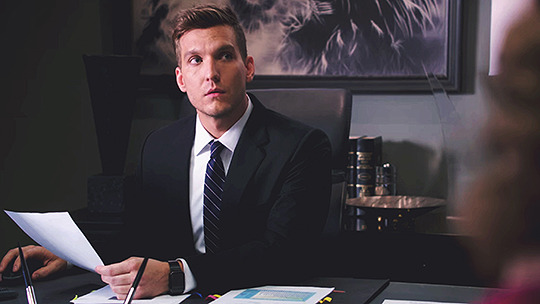
Nathaniel, probably: Sounds fake but okay.
In the season two theme Rebecca declares that as a girl in love, she can’t be held responsible for her actions, and the sweeping duet Nothing Is Ever Anyone’s Fault follows a similar thread of eschewing culpability. While this certainly works to help dismiss a season’s worth of questionable behaviour from the two of them—including, but not limited to, infidelity and conspiracy to murder—I’m not convinced the touted concept behind the song—that Nathaniel has learned the wrong lesson from being in love with her, as explained in post-finale interviews at the time—flies in the face of our understanding of Nathaniel’s character thus far. As a rich, straight, white, cis male whose privilege the show has only made clumsy attempts at dismantling, a disregard of consequence seems a lot less like something he needed to be taught by anybody and a little more like something that was probably ingrained in him at birth.
If we want to talk about misguided takeaways within their relationship, though, their relationship to happiness is the perfect place to start. Nathaniel begins the show with no concept of the pursuit of happiness, so it makes sense that when he does adopt an interest in it, he takes a page right out of the book of the person that introduced him and pins it all in the one place. Unlike Rebecca, though, Nathaniel’s preoccupation seems to be less wilful delusion and more of a case of ignorance being bliss—being with her feels good, so why change anything or interrogate the situation any further? For all his earlier talk, he is quick to give up the thrill of the chase under the hedonistic guise of contentment. Unfortunately, what he lacks is the emotional intelligence to navigate the implications of Rebecca’s disorder, highlighted by his belief that the mere fact that he and Josh are two vastly different people is reason enough for him to be able to dismiss her obsessive behaviour as ‘cute’ and ‘flattering’. Rebecca’s recent breakdown and consequential suicide attempt can’t exist as warning signs in their (what he perceives as superior) relationship because he isn’t planning on leaving Rebecca at the altar; he isn’t privy to the realisation that it ‘wasn’t about Josh, and maybe it never was’.

Nathaniel: I don’t want to get in the way of your therapy thing, but isn’t the point of all this to be happy? We’re happy. That’s what matters.
It’s a shame because despite there being so much more going on with Rebecca than Nathaniel is capable of comprehending at this point in time, he actually, perhaps entirely by accident, manages to get a few things right—he checks in with her about her therapy when her appearing on his doorstep contradicts the information she’d given him earlier (even if he is, at this point, all too easy to convince), counters her suggestion that they play hooky at Raging Waters with the compromise of a more sensibly scheduled dinner they’ll both enjoy, and, when they do come in to conflict over her obsessive behaviours, takes some time for himself before having a serious conversation with her. Though it’s certainly naive of him to think it’s a problem as easily solved as getting Rebecca to promise she’ll never do anything like this again, it suggests the capacity exists (given, with great guidance) for him to approach Rebecca’s mental illness within their relationship in a thoughtful way.
(This of course completely ignores the inherent issues in their boss/employee relationship, which come to a questionable forefront when Rebecca makes the decision to return to work after having broken things off, but we’re starting to get a little off-track from the intended scope of this discussion.)
The idea of romantic love as a chase—if not already sold to us by Rebecca literally moving across the country in pursuit of Josh—is hammered home most effectively in episode 2x11, but Nathaniel actually brings it up in the episode prior; before Rebecca and Josh leave for New York, at the same time as setting up the whole ‘man of my dreams’ idea that also carries on into the next episode, a sweaty Nathaniel beseeches Rebecca to imitate a land-based predator so he can amp up his workout under the threat of chase. Within this alignment, Josh, who ends up proposing to Rebecca at the end of 2x10, becomes even more clearly representative of an end goal—love, marriage, and, as an expected by-product, ultimate happiness. Nathaniel, by contrast for the time being, is all about the chase that comes before. After his speech at the beginning of 2x11 boasting of his dogged approach when securing clients, his passionate buzz words begin to permeate Rebecca’s subconscious, with ‘pursuit’ in particular going so far as to in an echo in a similar way that ‘happy’ does in the pilot. Such is the effect of his words on her that she parrots them back to Josh when she tells him she’s moved up their wedding—‘Finally, it’s coming to an end. The pursuit is over and I just want to celebrate that’. The title of the episode title may pose the question Josh is the man of my dreams, right? but in the most literal sense, the star of her dreams becomes Nathaniel, along with his personal brand of terminology.
Where Nathaniel thinks life is all about playing the hunter, Rebecca insists she doesn’t care for the chase, which makes sense—she doesn’t want to be chasing Josh, and furthermore, admitting that she’s chasing him would only be contradictory to her belief that they belong together. She wants her happy ending. She wants to arrive at her final destination—her destiny—because thus far all her journeys (which have in actuality been more of a kind of stagnation) have been left her unfulfilled. However obsessing over an idealised future only postpones her happiness with her inability to focus on the present. Ironically, the point at which she makes an active choice to begin shifting that focus—in 3x07, when Dr Shin encourages her to live in the messy in-between—is right around the time Nathaniel starts buying into her idealisation himself.
In a similar way to Rebecca, regardless of his purported love of the pursuit, Nathaniel’s infatuation is seemingly tied to the concept of a destination—several times quite literally. In 3x04 he’s ready to whisk her away to Rome to evade any obstacles to their being together, and in 4x01 proposes a similar escape to Hawaii, causing him to lash out when Rebecca turns him down—‘I want us to just be happy and be together. That’s what I want. You just said you love me, right? So can you just do that for me? Can you just stop overthinking everything? …seems like every time we’re happy, you try to ruin it.’ He sees their shared happiness as a nirvana state he’s caught a glimpse of that Rebecca is now determined to deny him access to, to the point that he seeks to make their version of a love bubble a physical one, where no outside interference (or, more accurately, internal reflection from Rebecca) can keep them apart. Still degrees behind Rebecca in the parallel arcs of their development, he’s stuck in the mindset that them being happy and in love is the only thing that matters. His behaviour is far from flattering, but with a quick review of his history of being on the continual receiving end of her rejection, it’s not entirely difficult to see where he’s coming from.
(As an aside, Rebecca’s relationship with the destination versus the journey as it pertains to the mural on her wall is something I’ve already discussed in a previous meta.)
When she breaks up with him at the beginning of 3x09, Rebecca responds to Nathaniel’s protest of ‘but we’re happy!’ with the qualifier that she’s ‘happy, but it isn’t real’, which probably isn’t the most pleasant thing to be told, even before you factor in Nathaniel’s implied inexperience with serious relationships. While her behaviour prior to this definitely calls for some self reflection, it’s an interesting backflip from extreme infatuation to sudden dismissal, and while it does align with the black and white thinking associated with BPD, it’s easy to see why Nathaniel feels blindsided and, consequently, spurned. She begged him not to break up with her not only to then turn around do exactly that, but to also (presumably unintentionally) throw in the humiliating implication he cared more than she did.
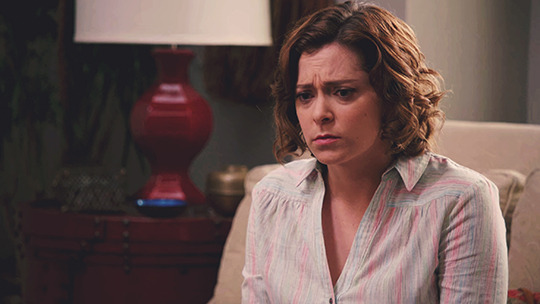
Dr Akopian: Maybe now you can see that your father’s behaviour in the past has set a pattern for you, seeking the love of men who don’t fully love you back. Who you have to pursue. Men who are taken or emotionally unavailable. Like your father. Like Josh. Like Greg. Like other men, I’m sure.
Nathaniel is an outlier amongst the three main love interests in that, for all his grandstanding about humans being hunters by nature, he’s the one constantly falling over himself to win Rebecca’s affection rather than the other way around; it’s ironic that the love interest that asserts himself as being all about the chase is the one that ends up later having to assign himself the title of ‘king of declarations’ based on his ongoing habit of blurting out to Rebecca how he feels, never achieving the level of emotional standoffishness he hopes to exude. Nathaniel’s unavailability—and subsequent cementing as one of the types of men Dr Akopian calls Rebecca out on being predisposed to pursuing—comes only when he enters into a relationship with Mona, and Rebecca, who supposedly ‘never cared for the chase’, with interest reignited finds a skewed sense of security afforded by the romantic roadblock, something Nathaniel seems to understand on some unspoken level, as hinted at by his eagerness to maintain the fragile status quo of their morally questionable arrangement.
As a result of this subversion of power dynamics within Rebecca and Nathaniel’s relationship, in amongst the many other parallels between them that only serve to support this, it starts to become apparent that, narratively speaking, Nathaniel is to Rebecca as Rebecca is to Josh, something that is visually co-signed by the show during 4x03, when we see the same golden glow of romantic epiphany crest behind Rebecca in the church during her speech at Heather and Hector’s wedding that suffuses across Josh when Rebecca encounters him in the streets of New York.
Nathaniel’s takeaway from Rebecca’s speech is that because he loves her, he should do everything within his power to get her back, which of course leads to his (frankly embarrassing) attempts to manipulate her and win her over in 4x04. (Fittingly enough to this discussion, the opening line of the Slumbered quote he plagiarises is ‘you are the only thing that makes me happy’. The irony of his failed use of her teenage diary to win her over is that I honestly do believe the speech is an accurate summation of how he sees Rebecca, and had he only chosen to put it in his own words, that final scene between them might have played out a little differently.) The part he probably should have focused on, though, is the part Rebecca is currently pouring all her professional energy into (and not so coincidentally, it’s right there in the episode title)—love (and therefore happiness) being about finding your own path.
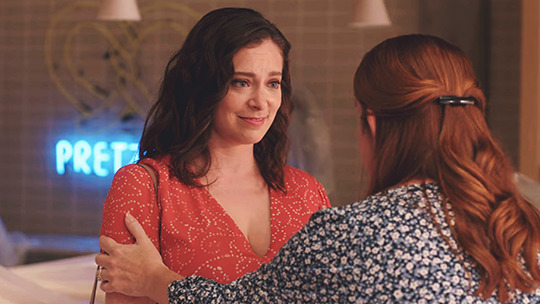
Rebecca: I don’t believe in destiny anymore. I just believe in taking responsibility for your own happiness.
This is not the first time Nathaniel makes the decision to actively pursue Rebecca while her attention lies firmly fixed elsewhere. In 3x03 and 3x04, he is forced to grapple with his feelings alone when a distracted Rebecca eventually goes where he cannot follow, putting an abrupt end to any potential for chase when she flees back to New York in 3x05. Consequently, Nathaniel embarks on a mini-arc of struggling to accept the idea that Rebecca may never come back—initially incomprehensible to him, owing to the fact that she bears importance to him, personally—to conceding that his (thus far relatively unexamined) need for her to be in his life is secondary to her own wellbeing, something that acts as a precursor to a major thread in Nathaniel’s (often one step forward, two clumsily-written steps back) character development in the back end of the series.
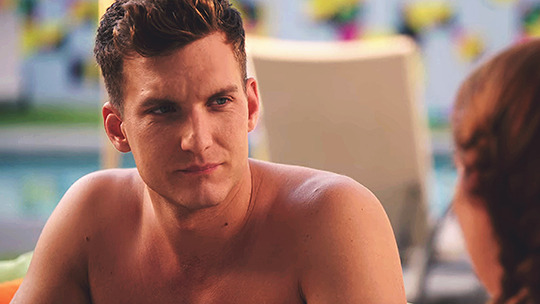
Nathaniel: I just hope wherever she is, she’s happy.
In 4x11, Nathaniel’s dream world amalgamation of Maya and Rebecca begs him to let her be happy, and as the former fades into the latter we get another callback to the pilot—an echo of 'happy, happy, happy…’ reminiscent of the empty shell of New York Rebecca latching onto Josh’s description of laid-back West Covina. Unlike its instance in the 1x01, however, this is a wake up call of an entirely different kind—it is not the blossoming of a brand new delusion but the sobering dissolution of one. And unlike the speech a radiant Rebecca gave at Heather’s wedding about finding the one you love and holding on tight, this particular iteration is here to impart the contradictory wisdom ‘if you really love me, you have to let me go’.

Nathaniel: I want you to be happy, I do.
This moment is arguably the true beginning of Nathaniel’s lesson that his happiness isn’t necessarily (or in this case, due to the current circumstances, can no longer be) inextricably linked to Rebecca—she has the opportunity to find happiness independently of him and that in itself is something that should make him happy, as someone that loves and cares for her. His assertion to dream Rebecca that he wants her to be happy manifests in his concession to Rebecca in the real world—‘I’m glad you’re happy. I really am. And it makes me happy too’—an exchange that echoes two similar moments between them back in season three, during which Rebecca expresses the same sentiment regarding his relationship with Mona, first following the cool down from their 3x10 conflict, and again in the aftermath of their ended affair in 3x13:

Rebecca: I’m happy that you found someone else. Mona seems lovely.

Rebecca: I’m happy for you… I want you to be happy.
The more interesting callback here though, of course, is to Rebecca’s conversation with Greg at the duck pond way back in 2x02. After finally tracking down an AWOL Greg with the intention of breaking the news of her involvement with Josh, Greg makes peace with the situation by way of reassuring them both that everything worked out fine as long as Rebecca is happy. ‘You and Josh—you should be happy together. You’re happy, right? And he treats you well?’ Rebecca responds to this in the affirmative, though her expression—and the context of the episode—belies her answer. In contrast, her exchange with Nathaniel goes a little differently:

Nathaniel: Because you’re happy, right? You’re happy with Greg. Rebecca: I mean, I don’t know. I’m not there yet. But I could possibly be, yeah.
The evolution of Rebecca’s response is of course evidence of her development as a character and her own understanding of her relationship to happiness, but what I find most noteworthy is not that she lies in 2x02, but that in 4x11 she chooses to tell an unusual truth. She could just have easily have said yes the second time around and it would have functioned as a clear enough juxtaposition of what she considers close enough to happiness; after all, at the time of 4x11 she and Greg believe they are approaching their relationship in a mature and thoughtful fashion, they are warm and affectionate towards one another and, unlike in 2x02, she is not having to compete for her partner’s attention. She would, by all accounts, be completely justified in giving what could be considered the normal response to being posed such a question—that yes, she is happy with Greg. So even though it’s encouraging to hear Rebecca verbalising her newfound knowledge that happiness is so much more than such a simple dichotomy of yes and no, it feels significant that Nathaniel, as a person currently knee-deep in untangling his own complicated relationship with happiness, is the one that gets to be privy to this particular brand of truth.
And while it can be argued that all the strides Nathaniel makes in 4x11 are undone over the course of the following episodes, setting aside the very real fact that human emotions are fickle, and we can’t always stick as completely to our guns as we’d like, his blessing here still comes with a telling caveat: ‘I’ve got to let you go… because you’re happy’. And who shows up on Nathaniel’s doorstep during 4x12 to poke holes in that perceived state of happiness between her and Greg? None other than Rebecca herself.
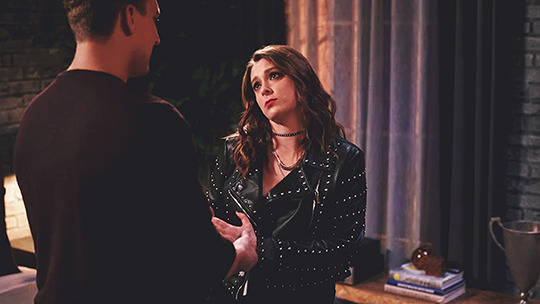
Rebecca: You just want me to be happy, which is what I want too, and god, Greg… Greg doesn’t know what happiness is.
Such is the shared significance of this concept of happiness between them that the second Rebecca alludes to their conversation in the foyer, Nathaniel’s previously good-natured, albeit slightly confused, response to her drunken presence in his apartment quickly and very clearly dissolves into alarm bells and he eventually sends her on her way. Though he could easily have wielded Rebecca’s visit as a weapon to create dissonance between her and Greg in 4x13, he merely probes for clues by way of a convoluted metaphor, resigning himself to the fact that the issue has been resolved, while Greg, in actuality, is at this point none the wiser. It’s only once Greg himself tells Nathaniel that it is over between him and Rebecca that Nathaniel returns to entertaining his feelings for her.
Though we the viewers are all too aware (and at this point, probably screaming at the TV!) that Rebecca’s happiness is not, contrary to recurring belief, a vacant role that she needs someone to fill; unlike us, the characters have not had the good fortune of being able to watch the show Crazy Ex Girlfriend on the CW network. Nathaniel is still a fledgling in terms of self enlightenment, and it makes total sense for him to be nudged towards into pursuing her again once the clearest obstacle to her affections—her relationship with Greg—is no longer an issue.
When she breaks the news of her decision to Nathaniel in the finale, Rebecca is quick to assure Nathaniel that ‘the times that [they’ve] spent together have been some of the best of [her] life’, which is an interestingly bold statement all on its own, but it feels somewhat satisfyingly like finally giving Nathaniel a real-life answer to the ‘we’ve had such happy moments, you and I, haven’t we?’ that he throws at his Maya-shaped projection of Rebecca in 4x11; affirmation that contrary to what she says in 3x08, something in there between them was real.
‘You only get one life,’ he tells her in return. ‘And you’ve got to live that the way you want.’
Neither of them uses the word ‘happy’ in this exchange, but as we fast forward in time, we get:

Nathaniel: Happy to be here.
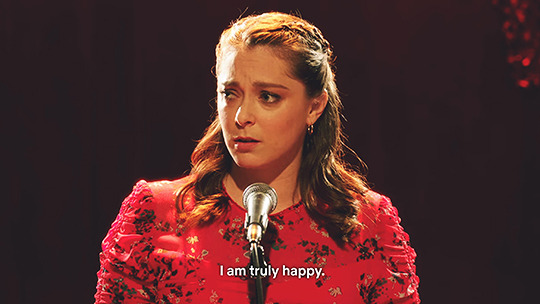
Rebecca: For the first time in my life, I am truly happy.
Nathaniel (who in an amusing reflection in 2x09, reveals that he, in a roundabout way, moved to West Covina because of Rebecca—‘it’s kind of your fault that I’m here’) has finally made the actual change that Rebecca taunted him with on their first meeting. And unlike Rebecca, he’s had a chance to interrogate what happiness for himself, removed from another person, might look like before he does so. Rather than starting with a life-altering change, he gets to make incremental changes along the way—which very much are tied to his entanglement to Rebecca—in order to make a more meaningful and deliberate life change for himself later on.
“When you find someone that melts the iceberg that is your heart…” - 3x03
“Provoking me, and zinging me, and challenging my world view. And warming my heart.” - 3x04
“You make me feel like I can be a different kind of person.” - 3x08
“You’ve awakened my heart and unlocked my soul.” - 4x04
“You’ve changed my whole life. Who I am, who I can be.” - 4x11
Rebecca describes her moving to West Covina in Nathaniel’s first episode as ‘[deciding] to flip things around. [Deciding] to put happiness before success. And when I did that, the world rewarded me with true happiness.’ In the finale, she tells the audience how he, by comparison, ‘upended [his] life’—‘You changed everything. But unlike me, you did it for the right reasons. And I am in awe of you.’ Alongside the nice progression from her proclamation in 2x09 that she ‘came to West Covina to search for happiness’ to her more self-aware announcement at the open mic that ‘for the first time in my life, [she is] truly happy’, (which feels like a subversive callback to a certain infamous butter commercial) we also get a reiteration of the sentiment— ‘I came to this town to find love. And I did. I love every person in this room’—that conflates happiness with love in what is now a healthy and satisfying way. It’s the perfect twist that she’s rewarded with the thing she was searching for all along just as soon as she realises she was looking in all the wrong places, and that the place itself still gets to play such a large part in that. And she is able to see Nathaniel’s journey as all the more meaningful in light of her own missteps along the way.
While I have my reservations on the bow they tied Nathaniel’s arc in for the finale (because despite Rebecca’s realisation that there is no such thing as ‘ending up’, there is in the sense of the scope of this series) being a well thought out resolution as opposed to leaning on a previous gag without laying any actual groundwork, the truth is it’s unclear what the true nature of Nathaniel’s sabbatical is/was/will be—mere extended vacation, permanent new career path, or just the initial spark of inspiration in some extended self discovery. That being said, much like Rebecca evolving towards a point where she can appreciate the interconnectedness of love and happiness in a less troublesome way, it is neat that Nathaniel’s resolution follows on from his tendency to want to escape to far-off destinations in an attempt to control his desired status quo. Though his fleeing town is still inextricably linked to having his heart broken by Rebecca, Guatemala, for once, isn’t about transposing his current circumstance to another place in order to cling to something, but rather a carefully selected, specific site for welcomed change.
Independent of any potential that may or may not exist between them as the show closes out—romantic or otherwise—it’s undeniable that these two characters have left indelible marks on each other, and without their respective involvement in each other’s lives, their journeys—and resulting transformations—would not have been the same.
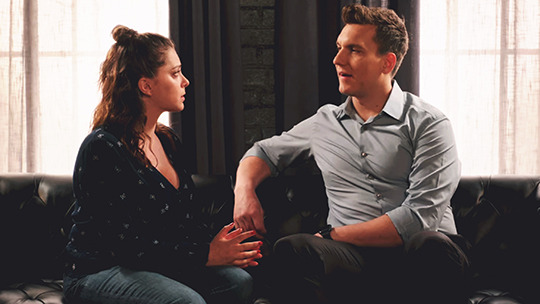
#crazy ex girlfriend#rebecca x nathaniel#rethanielaw#rethaniel#rebecca bunch#nathaniel plimpton#crazy ex meta#stop! meta time
69 notes
·
View notes
Note
ugh the thing about joker that makes me the most angry is the whole “he has a mental illness and this is such important representation” thing because it’s actually terrible representation of mental illness??? the “mental illness” is never named or explored??? and putting this violent character under the vague umbrella of ~mental illness~ is super harmful to people who actually have mental illnesses. like, ur not raising any type of awareness, ur perpetuating a lazy and dangerous stereotype, thx
this response ended up being extremely long because i really want to make it clear that joker is not a movie about someone who is mentally ill. im sorry in advance.
content warning because i talk about a couple of serial killers and the colorado mass shooting.
this is EXACTLY what i’m talking about. everyone’s like “oh he has a mental illness”, but where is the mental illness? what is it called? where is he getting treatment for it? his seven medications that we’re never made further aware of? i’m guessing it’s implied that he developed his condition from a brain injury after being abused by his mother’s boyfriend, but if that’s the case then we have some very disturbing implications:
this movie is not only perpetuating stereotypes about mental illness, it’s also perpetuating stereotypes about disabilities, and vilifying someone because of a physical disability with psychological effects
this movie inherently blames his mother, a mentally ill battered woman, for both fleck’s disability and his later moral demise
both of these points are designed to inherently absolve fleck of any moral culpability for his behaviour. and this becomes problematic, because the behaviour displayed in joker is not the behaviour of an abuse survivor, someone who has a disability, or someone with a mental illness: it is the behaviour of at best a psychopath, something which does not develop from any of those things, but at worst- and, i would venture, in reality- the behaviour of someone who isn’t mentally ill at all, but is simply cognizant and entitled: an incel, a white cishet man in the same vein as brock turner or james holmes.
the james holmes parallel i find especially obvious and disturbing, considering that shooting took place during a batman screening, and i don’t doubt that todd howard based his joker on holmes specifically. if you read about holmes’ personal life prior to the shooting there are some very stark, very undeniable similarities to fleck’s life as it’s portrayed in joker, which is very, very fucked up.
and think about charles manson, who was neglected by his mother and whose killing spree was most likely inspired by his failed career as a singer; edmund kemper, who murdered his abusive mother in addition to (iirc) about a dozen other women; ed gein, who prior to his murders exhibited bizarre symptoms like laughing to himself without warning. obviously aspects of these men made it into the portrayal of arthur fleck: but if there is one thing i have figured out through the years i’ve spent trying to discover why there is such a huge discrepency in the number of male serial killers versus serial killers, it’s this: white cishet men who turn to violence do so because they have a social space in which to do that. even if they are mentally ill and that mental illness is let down by the system, they still have a space- a taboo space, it’s true, but still a space which other people who are not white, cishet, and male simply do not have- they can go to to proverbially “lose their minds”.
it is understandable and even acceptable that white, cishet men can be violent if they want to. this is the same logic that leads to domestic violence not being prosecuted, rapists not being charged, and cops being able to brutalize or murder black people without consequences. the absolute extremity of those behaviours is mass or spree killing. so what then? can we blame the system, like todd howard wants us to do in joker? do we absolve white, cishet men of taking advantage of something the system allowed to do in the first place? or do we hold them to the same standard we hold women, trans people, and people of colour: a standard where you simply do not behave like that, because you do not have an allotted space in your society in which take out your feelings on other people?
yes! society does let down white cishet men. society continually tells them that they are entitled to sex, or women, or people laughing at their jokes, or making them feel smart, or getting to the front of the line, or incessant understanding, or the ability to do whatever they want, whenever they want, because they are white cishet men in a society where white cishet maleness is both the exception and the rule. except the reality is that no one is entitled to any of that even if society tells you this. it is in this discrepancy that we find incels, and it is there we find joker. it’s not a movie about someone who’s mentally ill. it’s not even a movie about fucking the system. it’s just a bad movie, and it’s made by someone who is entitled, for people who feel entitled.
(side note: if you don’t know the type of white cishet men i’m talking about and assume im generalizing every single white man on the planet, then i really can’t help you.)
68 notes
·
View notes
Photo
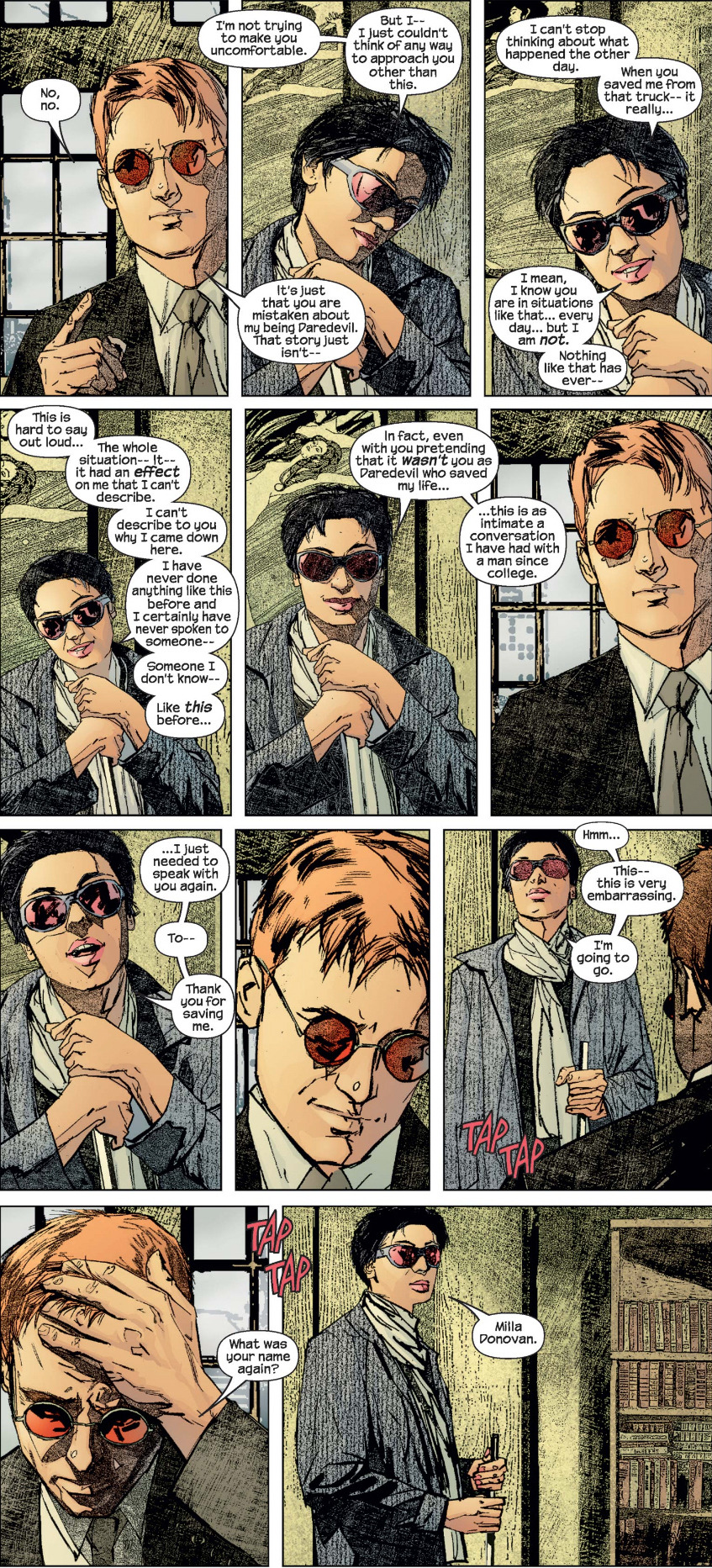
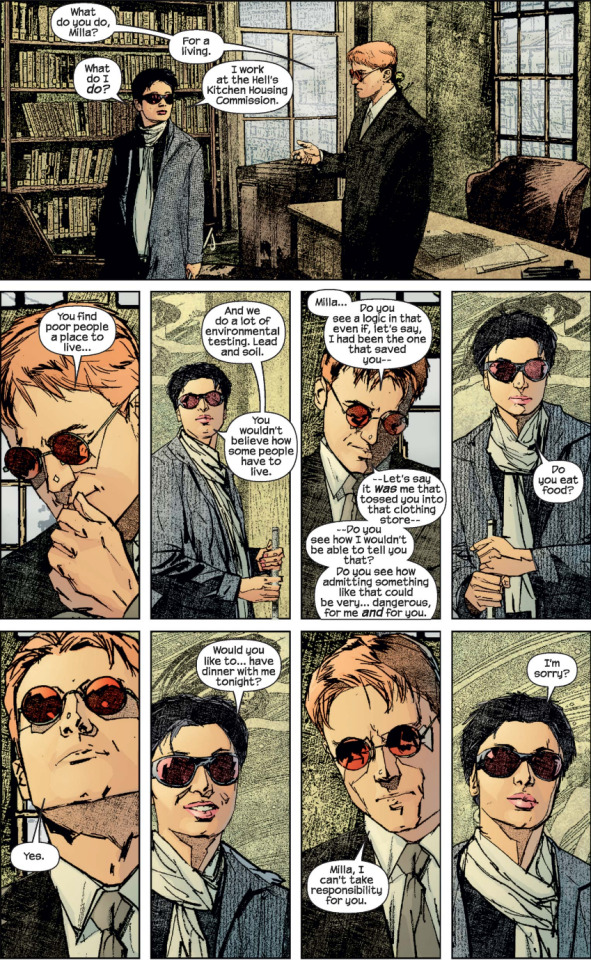
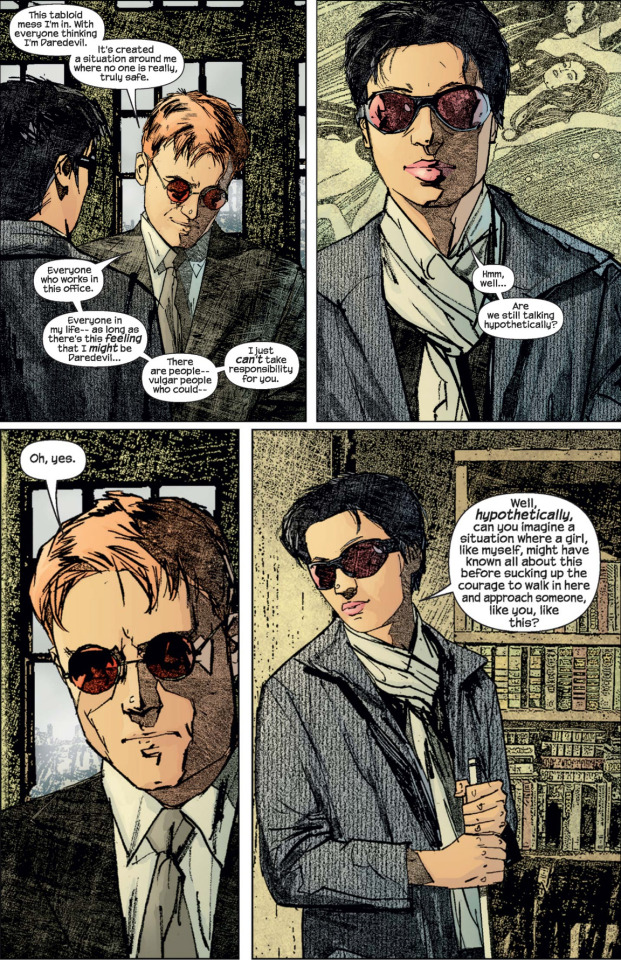
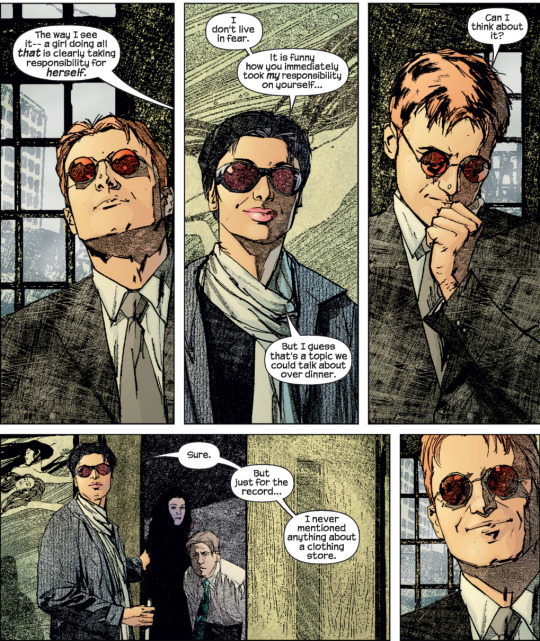
[ID: Excerpt from Bendis’s Daredevil run. Matt Murdock and Milla Donovan are alone in Matt’s office at Nelson & Murdock, talking.]
Milla: “I’m not trying to make you uncomfortable. But I-- I just couldn’t think of any way to approach you other than this.”
Matt: “It’s just that you are mistaken about my being Daredevil. That story just isn’t--”
Milla: “I can’t stop thinking about what happened the other day. When you saved me from that truck-- it really... I mean, I know you are in situations like that... every day... but I am not. Nothing like that has ever-- This is hard to say out loud... The whole situation-- It-- it had an effect on me that I can’t describe. I can’t describe to you why I came down here. I have never done anything like this before and I certainly have never spoken to someone-- Someone I don’t know-- Like this before... In fact, even with you pretending that it wasn’t you as Daredevil who saved my life... this is as intimate a conversation I have had with a man since college. ...I just need to speak with you again. To-- Thank you for saving me. Hmm... This-- this is very embarrassing. I’m going to go.”
Matt: “What do you do, Milla?”
Milla: “What do I do?”
Matt: “For a living.”
Milla: “I work at the Hell’s Kitchen Housing Commission.”
Matt: “You find poor people a place to live...”
Milla: “And we do a lot of environmental testing. Lead and soil. You wouldn’t believe how some people have to live.”
Matt: “Milla... Do you see a logic in that even if, let’s say, I had been the one that [...] tossed you into that clothing store-- Do you see how I wouldn’t be able to tell you that? Do you see how admitting something like that would be very... dangerous for me and for you.”
Milla: “Do you eat food? [...] Would you like to... have dinner with me tonight?”
Matt: “Milla, I can’t take responsibility for you."
Milla: “I’m sorry?”
Matt: “This tabloid mess I’m in. With everyone thinking I’m Daredevil. It’s created a situation around me where no one is really, truly safe. Everyone who works in this office. Everyone in my life-- as long as there’s this feeling that I might be Daredevil... There are people-- vulgar people who could-- I just can’t take responsibility for you.”
Milla: “Hmm, well... Are we still talking hypothetically?”
Matt: “Oh, yes.”
Milla: “Well, hypothetically, can you imagine a situation where a girl, like myself, might have known all about this before sucking up the courage to walk in here and approach someone, like you, like this? The way I see it-- a girl doing all that is clearly taking responsibility for herself. I don’t live in fear. It is funny how you immediately took my responsibility on yourself... But I guess that’s a topic we could talk about over dinner.”
Matt: “Can I think about it?”
Milla: “Sure. But just for the record... I never mentioned anything about a clothing store.”
Daredevil vol. 2 #43 by Brian Michael Bendis, Alex Maleev, and Matt Hollingsworth
I hesitated about posting this whole scene because it’s long, particularly when transcribed (Bendis really loves dialogue), but I decided that cutting it up or condensing it would be doing it too much of a disservice. It’s a great scene, and there’s a lot going on, and I wanted to include all of it.
Part of what I like so much about Milla is how ordinary she is. This is true of many other Daredevil side characters as well, but always only to a certain degree. Karen Page is a successful and glamorous actress for a while. Heather Glenn is a wealthy heiress. Glori O’Breen is a revolutionary. Dakota North is a supermodel-turned-private eye. Rosalind Sharpe is... Rosalind Sharpe. Kirsten McDuffie comes close, but there is still something polished about her-- her effortless snark, her ability to kick butt when needed. There’s nothing wrong with this-- I love it, in fact (see my thoughts on Glori’s character development in particular), but it is the nature of many non-superhero characters in superhero media to still feel slightly larger than life, and so it’s nice to find one who is more down-to-earth.
Another major factor in this is the use of perspective. Matt is the protagonist, and thus we see (“see”) most of his co-stars from his point-of-view. We are in his head, experiencing their behavior. This is particularly true of his romantic interests-- yes, we see scenes of them doing things on their own, but for the most part, the lens of Matt’s perspective and knowledge is always present. But Milla is engaging because-- while we do spend a good amount of time in Matt’s head when she is around-- there are some very hefty scenes in which we are made clearly aware of Milla’s perspective too. Her introductory scene takes place before she has even met Matt (thus, we know her better than he does), and their first meeting is much more from her point-of-view that it is from his. We watch her experience that encounter, and we see the effect it has on her even though Matt does not. This is followed up by a very candid scene of Milla awkwardly discussing her interest in Daredevil with a friend, who laughingly teases her about it. Again, we are getting to know Milla on her own, separate from Matt. Bendis excels at crafting characters who feel real-- partly through, yes, his dialogue, which breaks many of the dialogue-writing conventions but does so in a way that, when it works, makes his characters sound extra genuine. We see Milla’s infatuation, her discomfort, and that makes it very easy to feel for her and identify with her, because even if we haven’t all had a crush, or tried to ask a superhero out on a date, we have all had embarrassing interactions with people, and this leads us to root for her.
All of this carries over into the pivotal above scene, in which Milla insinuates herself into Matt’s office and asks him if he eats food out on a date. I love this scene for a whole list of reasons.
1. It’s super awkward. I mean, it gets better, but a person walking up to someone they’ve never officially met and thanking them for saving their life while the other person repeatedly insists that they did no such thing is going to be awkward no matter what, and Bendis makes the excellent decision of leaning into that reality rather than trying to soften it. It says a lot about Milla’s personality that in spite of this awkwardness, she still goes through with this and says what she came to say, and I then love her extra-humanizing “Hmm... this is very embarrassing. I’m going to go” when Matt just wordlessly stands there. (I also love “What do you do?” “What do I do?” Bendis is a master of this style of conversational humor.) They are both super uncomfortable, which causes us to sympathize with them, places them on equal footing, and makes the rest of the scene-- when they manage to work through the awkwardness-- all the more satisfying.
2. It undercuts Matt’s secret identity angst. We all (I assume) love Kirsten McDuffie’s playful handwaving of Matt’s insistence that he isn’t Daredevil, and this scene is the spiritual predecessor to all of that. Milla is convinced that Matt is Daredevil-- so convinced that she has put herself in this uncomfortable position to talk to him about it-- and so she has no interest in even acknowledging his denials. She just ignores them. And it’s really funny. It has been said before (on this blog, and elsewhere) that Milla exists in this arc as the anti-Daily Globe. She figures out his secret identity and the results are positive. Matt has spent issues denying, arguing, scrambling to defend himself against prying journalists eager to lay his secrets bare, and then in strolls Milla with “I know you’re Daredevil, and I’m taking you out to dinner.” And then she gets that smooth calling of his bluff on her way out the door, which is just... fantastic.
3. “I don’t live in fear”. And of course, we get one of Milla’s biggest character-defining pieces of dialogue. In some ways, it’s fairly standard-- Milla has a backbone, she isn’t frightened by the idea of hanging out with a superhero, and “I don’t live in fear” is an obvious reference to Matt’s own “Man Without Fear” epithet. But it’s a great, empowering speech, and it feels important. It gives Milla control in this conversation, and more than that, it gives her control in the relationship. She has chosen to seek Matt out, she has chosen to ask him out, and she has done it with the knowledge that it might not be safe. As the story goes on, we get the sense that whatever understanding she might have thought she had wasn’t quite accurate-- that she has definitely gotten in over her head. But in this moment, in this scene, it’s a powerful statement of intent and a comment on her character-- as a civilian, as a blind woman, and as a Daredevil love interest who is stepping into a legacy that’s drenched in blood. And I appreciate the facial expressions that Maleev gives Matt. You can tell that he is completely smitten with her, and that this speech has floored him. It’s fun to see him in this position, and it builds a strong grounding for the rest of their relationship.
I could go on. The artistic choice of placing a flowy, sensual painting behind Milla versus a closed window behind Matt was clearly intentional. I love the implication in the last panel that Foggy and Jessica were listening through the door. “Do you eat food?” always makes me laugh. This is one of my favorite Milla scenes, and with this creative team there’s always more to dissect.
#Daredevil vol. 2#Daredevil#Milla Donovan#Matt Murdock#Commentary#Milla Appreciation Day#Looong post. Dammit Bendis.
117 notes
·
View notes
Text
Connotation of “Talented” vs “Skilled”
I don’t know how they run classes in other countries that deal with understanding literary components, but one of the things I distinctly remember from my English classes here in the United States is talking about definition versus connotation. Sure, different words may mean the same or similar things, but the context in which they’re used, or the way they’ve been used in the past, can cause us to have different meanings associated with them, subtext, if you will. For example, when you’re talking about someone laughing, there are many words you can use to describe the action. You could say that they giggled, which has this aura of being cutesy or diminutive with it, maybe even a bit whimsical. Or you could chortle, which has the connotation of something sinister and evil, of foul intent. This is probably because we use the word often when writing villains, much like you would with a cackle.
The bottom line is, words have power, and which ones we use and how we use them leads to a number of different interpretations. So one thing I find myself wondering is which word is more flattering when complimenting my fellow artist: Talented or Skilled? And I suppose the answer depends on what kind of message you want to share. Let me copy and paste the definitions of each from Google to show you what I mean.
Talented: tal·ent·ed/ˈtalən(t)əd/
adjective
having a natural aptitude or skill for something."a talented young musician"
Skilled: skilled/skild/
adjective
having or showing the knowledge, ability, or training to perform a certain activity or task well."a lab technician skilled in electronics"
based on knowledge or experience; showing expertise. "skilled legal advice"
(of work) requiring special abilities or training."a highly skilled job"
See? They aren’t too far off from each other, but there are subtle things that make me think of them differently. When I think of someone who is talented, I think that they are naturally skilled, that whatever they’re really good at comes easily to them. Like they could do it in their sleep and have a good result. Maybe you’d even think they were born with it. But for skilled, I think of it differently. Skills are something you take many years to build up and refine. It requires a lot of learning, with time, effort, and energy put in. Skills are acquired through a journey, you can’t gain skills without also gaining experience.
I think it’s flattering to be complimented with either one of these words. When you say that someone is talented, that has the implication of “what you do feels natural.” To say that someone is naturally gifted, that they take so easily to something that they love, that’s so kind! Skilled implies more of a journey, like the person who sees what your doing recognizes that you put a lot of hard work into it, that this wasn’t something you got good at overnight. I’m more inclined to say that someone is skilled, because I think that gives them more recognition for all the time they’ve put in. Especially because not everyone that’s skilled is necessarily talented, the thing they’re really good at may not have come naturally to them at first. For some people, they really need to work at it to get to the level of quality they want. Both are really flattering for different reasons, and I love that!
And to give you an example, here’s how it’s applied to me. Now considering the arts are my main gig, it may surprise people to know that no one in my family or circle of friends expected me to be a visual artist of any kind growing up, and there are many reasons for that. I didn’t have an interest in drawing until the seventh grade, I don’t like getting messy with materials, and the big one: I have aspergers syndrome. The expectation for folks with my disability is that we’re logical and more inclined towards things like math and science, kinda like Vulcans in Star Trek in the most extreme cases. But let’s be real, I’m neither of those things, which is further proof that not every symptom on a list is applicable to every person with that diagnosis. I was never a natural talent for those things, where I excelled was in writing, and even though that felt natural, I still had to work for it. I had to work way more to be able to draw decently, and I owe it to having a lot of determination, practice, and a few really good teachers. Am I the best artist in the world, or my friend group? Not in the slightest. Do I still have a lot to learn? Absolutely. Am I still proud of how far I’ve come in the last ten years? Considering everything that was working against me, and how far I’ve come, yeah.
I’m extremely flattered when someone thinks I’m a natural, but I’m also really honored when someone looks at my journey and recognizes what I was up against and how tough it was to overcome. I may not share all the details of that journey, and I may not know the details of everyone else’s, but your journey is important to you, isn’t it? So what more of a reason do I need to respect it and want you to succeed? You’re doing your best. Your best changes from day to day sure, but it’s still your best, and that’s worth respecting.
10 notes
·
View notes
Note
💥🌸🔮💛 for Floyd Ray and Llyr! C:
Ah thank you Marti!!
💥 Are there any emotions your OC doesn’t know how to deal with, doesn’t understand or hates having to feel? Any reason behind this?
Floyd: already answered this with him and it was quite lengthy so linking the post with it right here!
Ray: Alright let’s do this. Ray does Not like to deal with sadness, and especially not grief. Anything that will impact him and cause prolonged sorrow is something he will desperately want to block out because those feelings feel Awful. Being the workaholic he is, this is usually trying to work through those feelings while doing anything he possibly can around the ship. In some more extreme situations, this spreads to roping in the rest of the crew with him, assigning more work and trying to keep everyone occupied so he doesn’t have the time to break down.
Reasons behind it? I’m actually not sure. There’s definitely something there about why Ray is so insistent on keeping things upbeat and morale high most of the time but, I’ll be honest, he hasn’t revealed a whole lot about his backstory to me yet. I don’t know much of where he came from and what led him into piracy, but I do know a lot about who he is right now.
Llyr: Oh Llyr hates the feeling of humiliation or inferiority. A lot of his time in his story has been spent desperately trying to avoid that but, uh, yeah that hasn’t quite worked out despite what he likes to think. So he’s been miserable and rightfully so.
The entire concept of him turning to his human form for the first time and immediately this species he’s considered inferior to himself for so long has power over and has to take care of him is. So overwhelming and such an unbearable feeling for him.
The only reason behind it is he was just raised like this. His parents were very against humans, having only had and heard of bad experiences with the species and decided using their human form was just a waste of time and energy when they could have a perfectly happy life living in the sea. They thought very highly of themselves and their family/species and taught that arrogance to their children.
cut because this got Real Hecking Long sorry my dudes
🌸 What’s a sentence that would make your OC’s day better? One that would make them laugh? One that would make their day worse? Why? What words would you have to say to them to completely ruin their day?
Ooooh okay this one’s gonna take some thought.
Floyd:
Make his day: “Need a hug?” or, alternatively but only from Ray, “Wanna cuddle?”
Make him laugh: *merciless tickling* or one of Ray’s puns might get a chuckle out of him. It’s gotta be a new one, though, he won’t take any of that recycling jokes bs.
Worsen his day: “What’s wrong with you?!” or “Why don’t you tell us anything?”
Ruin his day entire life: “I never liked you to begin with. It was all just pretend, moron, can’t you understand that?” or, if you prefer whumper feels, “Good morning, Benedict.” or Anything involving his first name really.
Ray:
Make his day: “Thank you.” is usually a safe bet, or “I love you.” from the right people.
Make him laugh: any opportunity to tell a bad joke will make him giggle and everyone else groan in advance :3. for example...
The crew is going fishing and at some point someone speaks up, talking about something they saw in town.
“We might need to set sail again soon. Saw some suspicious behavior earlier and I don’t think we want to be part of that.”
Ray hears this and instead of considering the implications of those words, starts to giggle uncontrollably. Heads turn his way with inquisitive looks, and some of them soon fall into despair as they realize what’s about to happen.
“Oh, so, you’d say...” Ray trails off into silence. Everyone’s sweating nervously, waiting to get the punchline over with. The air is thick with tension. “...it’s pretty fishy around here?” A collective groan escapes everyone, but one or two people nod their approval and laugh a bit. The pun sympathizers have a special place in Ray’s heart. Mabel turns to look at him.
“Ray... please...”
“What?” he asks, grabbing the woven ropes they’ve been using to catch fish. “Are you saying that’s net what you wanted to hear?”
“No, it.. I’m...” Confusion And Concern Intensifies
“Come on, no trout these are the best jokes you’ve ever heard. There’s nothing to be scaled of!”
Mabel.exe has stopped working.
Worsen his day: “Ray, I found another problem with the ship--”
Ruin his day: *heard from afar* “Walk, Benedict, we don’t have all day,” followed by the clinking sound of a leash being pulled taut and a strangled yelp. (though, thinking harder into it, this could also make his day. hmn, we’re getting into spoiler territory so I think I’ll leave this up to imagination)
Llyr:
Make his day: “You’re free to go,” would be a nice one right about now.
Make him laugh: “You trust me, don’t you?” might get a small chuckle if said by a human, depending on his mood.
Worsen his day: “Kneel, brat.”
Ruin his day: “I know you’re a selkie.”
🔮What does your OC think is their best trait. What is actually their best trait? What about their flaws? Are they one to admit these flaws or do they like to pretend they’re perfect?
Floyd: Oh hmmm,,, for Floyd this is definitely a complicated one. I think he would eventually settle on his general ability to help others. His most prominent duty on the ship is often more social or medical matters, considering he isn’t especially strong. Like yeah he can do pretty hard physical labor, but not as well as some others. Braining things are more his groove, thinking stuff through and all that.
His actual best trait? Well he’s not as far off as I thought he’d be. His compassion is one of the best and most defining parts of him. It’s not really as much of sympathizing with people as it is just understanding people. He thinks people through well, often good at seeing what someone is like after watching their movements and expression after years of developing that skill for survival. Finding out what will please versus anger them can help him greatly.
Floyd has a hard time deciphering Percival. He’s just a mess and that makes it really hard to find things the man wants. Well, other than what he asks of Floyd. And doing magic just to get hurt really isn’t his cup of tea most of the time so it’s a bit of a struggle huh.
Ray: Ray definitely thinks of his own compassion as his strongest trait. He tries his best to be understanding and kind, encouraging an atmosphere of love and positivity and offering his help to anyone who may need it. However, this is very prone to get him into trouble and comes in as a flaw just as often as it is positive. He has more of a emotion based compassion than Floyd’s logical thinking based compassion, and even though it allows him to be open with people and vulnerable when he needs it, it isn’t always good.
No, Ray’s greatest trait is his unwavering determination. He is the embodiment of Not A Quitter, and even if it may look as if he’s tossing in the towel and giving up, give it an hour or two and he’ll be back on his feet and trying to push himself too far and put himself in harm’s way all over again. Though this can also be very unhealthy and manifest in worse ways for him, it stands as his best trait to me because it’s so often positive and is the main reason he can effectively lead his crew. He has so much faith in all of them and in himself and that doesn’t give them much room to doubt his abilities.
Llyr: Ahhhhmmm okay. Llyr. He doesn’t have a whole lot of best traits huh. Well. He is resilient. I’ll give him that. He does a good job of hating on mankind through all the hurt he’s already going through. Because yes you’re still Very superior to these people easily dominating and hurting your dumb ass, buddy. Sounds About Right Huh. Listen we are just in a Salty About Llyr mood tonight because he’s. So spiteful. And as much as I love him for it, I’m also sitting here like “........you petty little bitch.” so hm I think that’s all the brain machine is gonna give for this question in particular.
💛 What is your personal opinion of this OC? Do you love them or are they your trash child? Are they your baby?
This was asked last and I’m answering it first because I’m laughing so hard I love this question.
Floyd: Ohhh Floyd is so babie,,, I feel so bad for him because the more I think about him and his character, the more awful stuff I realize he’s been through. And he’s the one still around here getting hurt, in Persistence at least. I love him and he’s wonderful.
Ray: Y’all, I’m love Ray so, so much. He’s really grown on me and considering what I have planned for him in both stories he’s in, he really do be in for it now but I’m so excited to see him deal with these struggles and overcome them. He’s so protective and headstrong at times and I love him so much for it.
Llyr: INDEED THE TRASH CHILD OF THE FAMILY!! HE’S SUCH A STUCK UP, EGOCENTRIC BRAT AND YET HE IS MY CHILD AND I’M ROOTING FOR HIM TO BE LESS OF A JERK EVEN THOUGH HE’S NOT COOPERATING WITH THAT.
#the boysssss#Raymond Bates#Llyr the Selkie#Benedict Floyd#piratez#wee woo#answered#thanks marti i talked many words about my boys :333
4 notes
·
View notes
Text
Just Fiction (and When It’s Not)
I’ve been tying myself in mental knots for the last while about the “It’s Just Fiction” argument. At this point I’ve heard a lot from both sides that’s actually pretty valid, leading to a lot of general confusion.
The conclusion that I’ve come to, though, is that “It’s Just Fiction” is not a universal defense, and its meaning shifts drastically when it’s shifted out of the originally intended lens.
I propose that there are three lenses through which the “It’s Just Fiction” argument can be viewed: in-universe, authorial intent, and public interpretation.
Before jumping into the analysis, I should note that there are a few assumptions here:
The fiction in question is actually fiction, and does not resemble any real life persons, living or dead in an identifiable capacity. Therefore, things like the Ted Bundy Case Files are immediately disqualified.
We are assuming innocence until proven guilty.
The In-Universe Lens
The “It’s Just Fiction” defense is most often applied to in-universe logic, and is related to the suspension of disbelief--the mechanism by which we can ignore our comparisons to the real world and immerse ourselves in a fantasy.
When you say "It's Just Fiction" about in-universe logic, it understands very clearly that fiction is fake, and that the characters and events do not exist in the real world. It may echo real life, and real people might to replicate it, but no matter how dark or gross or fluffy or fantastical the content, no matter how gritty and “realistic” it is, it is not real.
Arguing that "It’s Just Fiction" is basically stating that you understand how to separate reality from fantasy, and treat characters and in-canon logic as the mechanisms by which an interesting story is told. While they may feel real, especially if you have a special connection with them, they fundamentally are not.
As a result, content creators are generally allowed to use it as space to explore taboo topics and search for relationships and meaning in places that no sane person would enact in real life.
However, this is not free reign to create whatever you want, and expect no consequences, as we will get to in our next point.
Authorial Intent
As stated earlier, the general assumption here is that the content creator did not intentionally have ill will towards anybody. Unfortunately, there have been too many case where this has proven to be bad faith. As a result, how to approach this aspect of the “It’s Just Fiction” argument is very difficult and controversial, because sometimes it is very difficult to “prove,” especially since the creative process is often multi-faceted as content creators draw from multiple inspirational and motivational sources.
Oftentimes, content creators are young, ignorant, and lacking self-awareness. This leads to them not knowing how to take critique, especially if they are approached in a harsh, critical manner, and generally only alienates them in a way that stifles their desire to learn and grow naturally. It is generally not your job to educate strangers on the internet, either, since there are often trolls who disguise actual ill intent as ignorance.
The most surefire way to address this is to curate your own internet experience by blocking liberally those whose content you do not wish to see.
There is another case, though, that needs to be discussed: that of predatory content creators. These people usually straddle the line between “a distasteful lack of mindfulness” and “preying on vulnerable populations.”
Accusations of ped/o/phil/ia against any individual are serious, and in process you have to consider a personal history of predatory behavior, rather than applying a blanket "if it's dark and taboo topics, then it automatically implicates the author as a pervert.”
You can usually identify these individuals based on the content’s tone and approach--that they aren't approaching a taboo topic for the sake of literary exploration, but because they are self-inserting themselves. There are heavy implications about people who self-insert into that sort of fiction, such as people who write or draw cartoon character CP, and you can usually tell on a case-by-case basis whether or not somebody is hiding a gross perversion behind "It’s Just Fiction.”
Public Interpretation
Public interpretation is usually where the “It’s Just Fiction” argument breaks down entirely, because we are no longer working directly with the work (in-universe) or the people immediately responsible for its creation (authorial intent). Public reactions are very, very real and need to be treated as such--but first, you have to consider the likelihood that a work of fiction will actually contribute to swaying that public.
The argument here is “even if the person didn’t mean any harm, that doesn’t mean that they shouldn’t be held responsible.” And this is another tough one, because on one hand, yes, content creators ideally should exercise mindfulness about how their work will be received and interpreted. On the other hand, the public is beyond the control of any single individual, and things can easily be taken out of context or snowball out of their control, regardless of their intent.
So, for the sake of this particular case, we have determined that the author did not mean to cause harm, the next question is how much harm is being done.
In other words, who exactly is the public, and how many of them are there?
For instance, a bunch of kids filming a shitty monster movie featuring sharks may have the exact same messages as Jaws (sharks are evil and need to be killed). Neither one of them intend to do real sharks any harm; however, the one that needs to be held responsible is Jaws, not the shitty indie film.
Why? Because Jaws was a box-office success that became a cultural phenomenon. It impacted the opinions of the millions of people, leading to a sharp increase of shark hunting.
Yeah, the indie film was equally bad in the messages it was conveying, but it just fades into obscurity without actually doing any harm.
It’s the same spiel with fandom works. Because fandoms are insular spaces, they feel a lot bigger than they actually are. That’s why fan-content creators are not held to the same standards as mainstream content creators, because the public they actually affect is actually quite small.
When people say “It’s Just Fiction” in relation to content that is not intended to do harm, but is controversial in content, what they’re really saying is “fandom is a small, in-bred pocket of the internet, and and because it is not written by somebody intending to cause harm and will never likely see the public eye, the damage that it does is negligible, and any energy that you put into causing an outcry over it is merely a petty waste of time.”
At which point, again, the best course of action is to just block what you don’t want to see.
Applications
This is a long read, and the basic point is to exercise your own critical thinking skills. My general rubric for what I keep versus what I block is:
Is the content actually fictional.
Is the content creator acting out of a desire to hurt others?
If the harm is unintentional, how many people are affected, and how wide-spread is the damage?
Let’s Practice
Case 1
Person A is obsessed with a villainous character from an anime.
They know that the character is completely made up.
They have no desire to hurt other people, since this affection for a fictional character is literally just them. Their actions do not pose a threat to vulnerable groups.
The number of people even directly aware of Person A’s special interest is pretty small, and if you’re squicked out by it they’re an easy block.
Therefore, by this rubric, “It’s Just Fiction” works just fine as an explanation for their actions.
Case 2
Person B’s fanfic reduces your favorite character to LGBT+ stereotypes. The tone of the fic, though, is fluffy and light-hearted.
Again, this is entirely fictional and all parties know it.
It’s difficult to gauge whether this was done intentionally or not; sometimes a quick chat with the author will clear things up; otherwise, the tone of the fic and the lack of mean spirit in any of their other works, so it’s probably unintentional. It’s probably safe to give the benefit of the doubt.
The general readership on the fic and the number of kudos is pretty low, which means that it’s not getting much attention anyways. It was distasteful, it made you feel gross when you read it, but overall the damage is pretty contained.
Therefore, by this rubric, “It’s Just Fiction” still generally works, because of the limited number of people even aware of the fic’s existence.
Case 3
Person C made an AU with characters aged-up from the canon, and there are some N/S/F/W scenes or jokes!
AU = fictional
This is a tricky one sometimes, because there are absolutely people who age up characters just to “legally” draw them in N/S/F/W situations.
However, there is a difference between people who do that, and others who say, project out an entire timeline full of unique character interactions and are looking to explore the various aspects of adult life, which sometimes involves consensual sex. The authorial intent here is usually pretty easy to pick up on, because a well thought-out aged-up AU often takes a lot of mindfulness on the part of the creator.
Again, things limited to fandom spaces are by default pretty small in the public that they reach.
“It’s Just Fiction” absolutely applies here because of the amount of work that has been put into it to create an adult version of the world and characters, and it’s clear that the intent was not to expose minors for the entertainment of perverts.
tl;dr: If you’re going to treat fandom with academic scrutiny, please apply critical thinking to situations as they come. “It’s Just Fiction” does not work as a general statement because it wasn’t originally meant to be a general statement.
535 notes
·
View notes
Text
I’m going to cut this so y’all don’t have to stare at it and feel free to block the “cats the movie musical” tag if you don’t want to hear anymore about it because even I’M getting fatigue already, but I just need to get these thoughts out, and I wish I could promise this would be the last thing I’d say on the subject, but I keep thinking that and then going, “AND ANOTHER THING!” so
I have a friend on Facebook who remarked that the CGI is the exact amount of creepy and weird to match the feel of the musical and yes, that is exactly my feeling as well. If your first introduction to Cats is seeing it in a theater and you’re above the age of... I don’t know, 14 maybe? I feel like a lot of the initial reaction you’re going to have is a vague sense of unease. Like look at all these people dressed in skintight clothes and fur and singing and dancing around and it’s all weirdly sexual sometimes, like one of my earliest bisexual awakenings was the girl who played Bombalurina in the 1998 movie, and if you haven’t come into the theater understanding that this is what you signed up for, it’s... weird, at the very least.
Intentionally or not, I think the musical is supposed to make you feel a little unsettled (I’d like to say “intentionally” because I like the implication of staging, costuming, makeup, music, direction, and dance all coming together to give you the sense that you’re intruding on something humans aren’t supposed to see BUT I don’t trust that easily). It opens with a bunch of cat eyes staring out at the audience while synthesizers literally “meow” at you. It’s weird. That’s kind of the point, I think.
At the same time, were it my big budget Christmas Oscar attempt, I’d have tried to stick with costuming and makeup, because that’s unsettling enough, but I understand why they didn’t, because directors and producers in the year of our Lord 2019 have all the self-restraint of a five-year-old given a hundred dollars and set loose in a candy store. You’ve got the budget for ridiculous amounts of CGI, you’re going to use ridiculous amounts of CGI, even if it makes the whole thing look like it will make furries reconsider.
(also I feel like the reaction to it would’ve been significantly softened if the trailer had been prefaced with the behind the scenes video they released the day before that said, “we’re going to put fur on people!” because I was expecting much, much worse)
They’d never have gone with just animating normal looking cats because the musical has no plot and only really impresses people a lot because of the songs and dancing. Like shit, the Mistoffelees dance is technically bananas, and I cannot imagine the musical being anywhere near the same without the big dance number right smack dab in the middle, which would not work nearly as well with cats that looked like actual cats. Like the difference between

which is cool and impressive versus
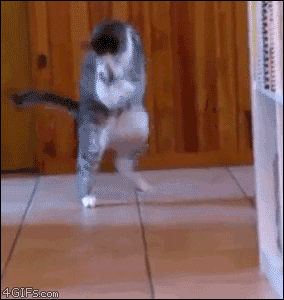
which is hilarious but also ruins the mood of the scene (which is triumphant and celebratory, not “...is my cat possessed?”). And then you add that the whole thing is supposed to be, at least in my perspective, how cats see themselves rather than how they actually ARE, and going the animation route just wouldn’t have worked.
I have a LOT of questions now, and I feel like ALW was a little more involved in this than he should’ve been (his Very Bad input and control is why the PotO movie was utter garbage, as nothing changed in the direction and staging from the stage musical, which you can’t do with movies, but here we are again), and I don’t think this is objectively GOOD, but (a) I get why they did it, and (b) I can’t think of a way it would’ve logically happened differently.
EXCEPT.
It’s coming out the same day as Star Wars, so maybe this is like Sonic where they released the bad version to get people talking so they could push the release date back anyway and not have to worry about making exactly zero dollars opening weekend.
(pls imagine going into a theater to see a film that night and everyone else is going to see a Star War and you’re like “fuck that, gimme CATS” and you’re the only one in the theater)
I wish I could say with confidence that these were my final thoughts on the subject, but that would probably be a lie, but I’m already so tired.
#cats the movie musical#jellicle swift#but really is idris elba there on purpose or did he lose a bet?
6 notes
·
View notes
Photo

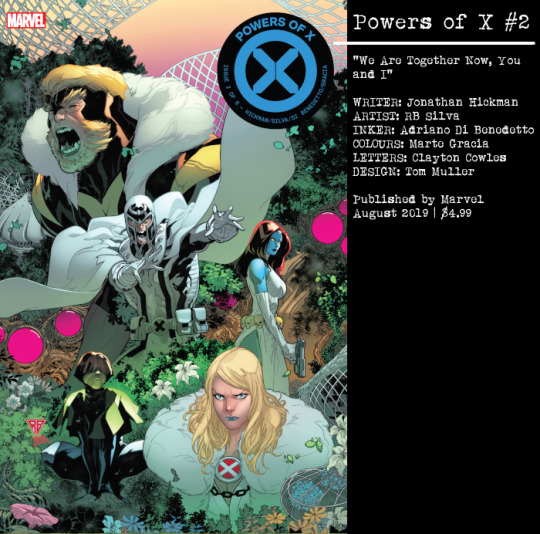
House of X #2 kind of broke my brain. It changed the rules so thoroughly and basically tore up the map we thought we had that trying to correlate different information now might be an exercise in futility. It’s fun, but it could all just be steam and dust, floating on the wind. In one issue, Jonathan Hickman, Pepe Larraz, Marte Gracia, Clayton Cowles, and Tom Muller changed the game and made us realize pretty much anything was possible. And not to necessarily believe our eyes because anything was possible.
Powers of X #2 was more subdued. Not as brain-breaking, but still makes you wonder about how all of the pieces come together and what exactly is going on when and to which iteration.
We continue on here building out a more logical progression of story within the various time periods, even while working within the new framework. While the scope of the story being told remains massive, it’s at least being delivered in manageable and entertaining chunks.
RB Silva, Adriano Di Benedetto, and Marte Gracia gives us possibly some of the most beautiful artwork to date on this story. The composition and colour in the opening pages is just exquisite. It seems like as the story unfolds into a gigantic, almost living organism itself, the art is keeping up in pace. The visual storytelling is integral to the increasing huge ideas presented in the tale.
This continues to be an incredible, must read story.
There will be spoilers below this image. If you do not want to be spoiled on Powers of X #2, do not read further.

SPOILER WARNING: Below I’ll be discussing the events, themes, and possibility of what’s going on in Powers of X #2 and beyond. There are HEAVY SPOILERS beyond this point. If you haven’t read the issue yet and don’t want to be spoiled, please stop reading now. You’ve been warned.
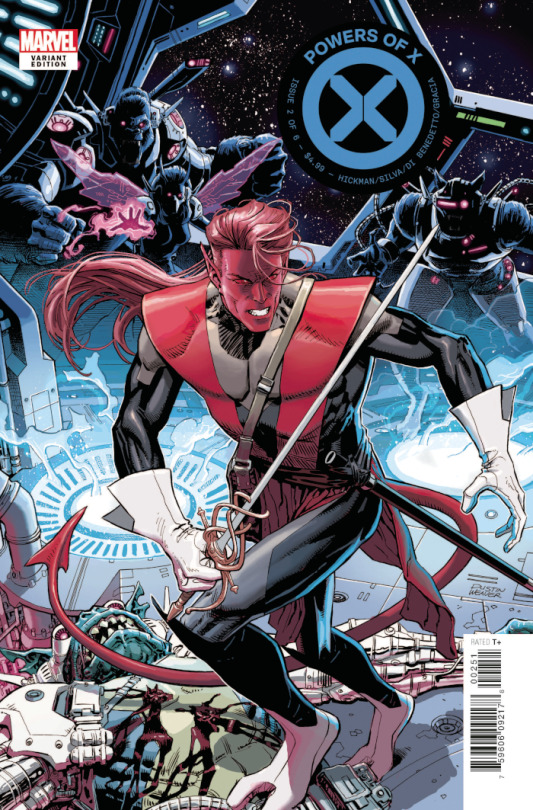
PREAMBLE | First Impressions
As I stated above, because of what happened in the last issue of House of X, I really don’t know what to think any more. The tapestry of introducing Moira’s multiple lives and the variance of the time frames means that it’s no longer clear what’s happening when. There’s no concrete information provided in text as to what life we’re on, or even whether or not the different time periods we see are even the same life.
Hickman and his collaborators have essentially rigged the story where it’s still possible to go deep, overthink and analyze everything that’s going on (and I mean, this is fun as hell thinking of all of the different possibilities), but it’s almost at the point where you should just sit back in awe of what’s going on and let it unfold. Our frame of reference has shifted and our understanding of the universe has been called in to question.
It’s incredible storytelling and it puts you on edge for what’s possibly coming next because it feels as though anything is possible.
ONE | The Long Con
A question is raised through Moira’s revelation to Charles and then to Erik of her status as a mutant, and the combined history of her previous nine lives, when it comes to how this fits, or even if this fits, within our current understanding of the existing 616 Marvel universe continuity.

Though there are possible permutations, I feel like there are two primary possibilities for what we see from the knowledge that Moira X imparts on the two “old friends”. The first is fairly simple, Life Ten and what we’re seeing in X0 and X1 are new. They’re offshoots that are similar to the mainline continuity that were accustomed to previously, but that it’s a new timeline. That Professor X and Magneto working together in this fashion is something new (quibbling about how what’s presented in X0 not entirely lining up with a Year One since Charles is in a wheelchair now and Magneto has his island notwithstanding) and the collected mutants are operating based on the knowledge that Moira has shared to achieve supremacy goals.
The other option is that Xavier and Magneto have been lying to their friends, students, and fellow mutants for countless years, playing at being enemies, and keeping the truth of the nature of reality and the man-machine/mutant conflict a secret for countless years. Though certainly plausible, especially given the other retcons that we’ve seen regarding the deadly genesis and how many times Magneto’s mind has messed with in one form or another, it seems a bit like a jerk move. Controlling certainly fits with the excesses of some of Xavier’s narcissism, but it’s a retcon that kind of makes them more villainous. I think if we’re aiming for a “best possible world” scenario that unlocks a Life Eleven, running a long con on everyone would potentially be detrimental to the scheme.

Also, at the very least the X1 version of Cyclops seems to be marginally aware of a broader plan as Xavier and Magneto are discussion the timeline’s manifestation of NIMROD. Granted, that could be a deliberately dropped misleading reference to make us think that Cyclops is in the know (given that he’s faced NIMROD before and could just be taking it as a reference to a future that he already knows), but in a story where time, space, and reality matter, it feels more like a hint.
There is, of course, a kind of monkey wrench thrown in the idea, though, in that we’re left wondering why now for the decision to move to Krakoa, to plant the seeds, and to claim their own piece of the pie. What’s the catalyst to drive the new world order? Why not do it before in terms of placement within Marvel’s timeline.
TWO | Beyond Good & Evil
There’s a very complex morality at play in this story, starting with Magneto’s guided tour in House of X #1 through to the conflicting and contrasting ideologies of Xavier and Magneto that are at least attempted to be bridged in the opening scene from X0. That there needs to be a redefinition of what’s good and evil in context of the full survival of mutantkind.
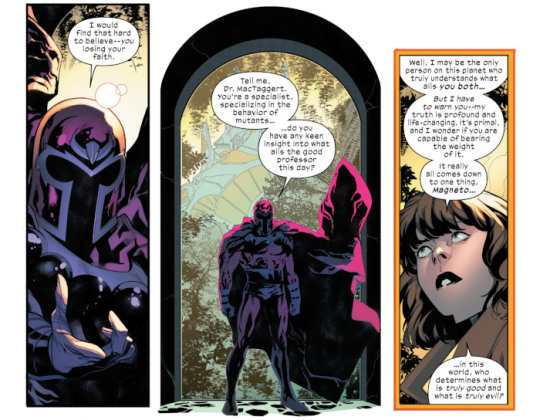
It’s interesting that Hickman is using Magneto here as the arbiter of good and evil, both from his own history, but also from the various Jewish ideas and connotations that have been seeded since even the opening pages of House of X and the tree. Here we’re getting moral philosophy by way of Nietzsche and at least a feeling of ressentiment in relation to mutant society continually being beating down.
Xavier and Magneto coming together suggests breaking a repeating cycle of blame and failure, of counting one as good and one as evil, rather counterbalancing one another’s natures to achieve something greater. It recontextualizes the struggle into something else and the knowledge that Moira brings to the situation demands breaking the previous cycles and old patterns. It necessitates them thinking of the conflict with man as something else.
And I’m not sure we’re there yet. While at this point there may be a reconciliation and cohesion between the visions of Xavier and Magneto, there’s still an external bogeyman in humanity and their machines that triggers the overall schism between one people and another. Even if mutants are united, they’re still at odds with man who want to destroy them, perpetuating the deleterious cycles.
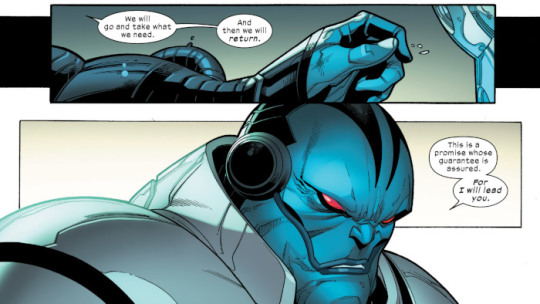
But there seems to be a third way outside of Xavier or Magneto’s traditional positions of integration versus domination. In X2, in the future Apocalypse is still contemplating survival of the fittest as mutantkind on Earth has dwindled to barely more than a handful and all of existence seems to be threatened by the Man-Machine Supremacy guided by NIMROD. It feels like in the future presented here mutants have already lost. Even with the possibility of maybe recreating either of the forms of breeding pits, it feels like the genetic diversity to support an entire population is dead.
So, we’re left wondering why we’re seeing this dystopian future, other than just playing with similar themes to X-Men comics. Personally, I think it’s trying to tell us that there needs to be a merging of the philosophies of Xavier, Magneto, and Apocalypse, a true transcendence of previous divisions and a synthesis of their ideologies.
I get the impression that X2 is Moira’s Life Nine, rather than the future of X0 or X1, and we’re learning something that should be applied in Life Ten. Of course, I could be completely wrong. Also, like with the shaggy tree thing seemingly being a composite of Krakoa and Cypher, rather than Black Tom, and the possibility that Green Magneto isn’t Magneto, I don’t know what to think any more.

This also ignores X3, which is the point at which I tap out. The structures of societies and the ideation of hive minds is beyond me. Me trying to interpret it would be like your dog trying to explain red. I’m not sure how it fits, since, to me at least, absorption into a singular mind, minus individuation, while it is some people’s conception of godhead, sounds like a nightmare.
It is neat, however, how it incorporates more traditional Marvel and X-Men history as it suddenly makes the Phalanx and the Technarchy important again. Even with a bit of rejiggering of their various statuses.
CONCLUSION | A Fool on a Hill
So where does that leave us?
With four different time periods that we don’t succinctly know how they’re truly connected. A game plan from Magneto and Xavier that might lead to salvation, but possibly ruination again. And a whole lot more questions as the series continues to unfold in unexpected but exciting ways.
Also, Marte Gracia’s colours are gorgeous. If nothing else, even as the story threatens to fracture your mind with its implications and twists, it’s beautiful to look at.

d. emerson eddy is prepared to have everything he’s written here be proven wrong again come this Wednesday. It may well be an exercise in masochism.
2 notes
·
View notes
Text
Kavanaugh Shouldn’t Be on the Supreme Court. Neither Should Anyone Else.
Last week, millions watched the dramatic hearings pitting Supreme Court nominee Brett Kavanaugh against Christine Blasey Ford, who courageously narrated her experience of being sexually assaulted by him decades ago. Once again, Americans were confronted with the brazen entitlement of the male power establishment. The hearings stirred up traumatic memories for countless survivors, ratcheted up partisan tensions, and catalyzed furious responses from feminists and progressives in view of the implications of the court shifting further to the right. With Roe v. Wade hanging in the balance, critics point out the horrifying irony of an unrepentant sexual predator potentially casting the deciding vote to block abortion access to millions of women and others across the country.
We applaud the courage of Christine Blasey Ford and everyone who has supported her through this ordeal. We don’t want to see Kavanaugh on the Supreme Court, either. But should any man be able to wield that much power over the lives of millions?
What if the Trump administration manages to find a judge with the same views, but with no history of sexual assault? Would that render the confirmation process legitimate and their decisions of the Supreme Court beyond question? Should people of conscience accept the sovereignty of a nine-person elite over the most intimate spheres of their lives?
If you don’t think so either, you may already be an anarchist.
What does it look like to resist the nexus of rape culture and far-right power that Kavanaugh represents? The usual suspects propose the conventional solutions: calling representatives, canvassing for Democrats, taking to the streets to hold signs indicating our displeasure. But even if these efforts forestall Kavanaugh’s nomination this time around, they won’t disrupt the relations of power in which hundreds of millions are held hostage to the machinations of a small, mostly male elite. A victory against this particular nominee would only reset the clock; eventually, Trump will force through a new candidate who will rule the same way Kavanaugh intends to. And even if Trump is impeached or a Democrat is elected and a progressive nominee is sworn in—we’re still in the same place we started, vulnerable to the whims of a judicial aristocracy and alienated from our own power and potential. We need an approach that challenges the foundations of the system that put us in this situation in the first place.
Meanwhile, progressive critics such as Amy Goodman have demanded an FBI investigation as a way to give official weight to Ford’s testimony and hopefully discredit Kavanaugh as a candidate. Goodman points out, reasonably, that Trump’s claim to be in favor of law enforcement while hesitating to order the FBI to look into Kavanaugh’s sexual misconduct reveals his hypocrisy. This logic positions progressives and feminists as the honest proponents of law enforcement—and police as protectors of women. Have we learned nothing from decades of rape crisis organizers explaining how the police and courts so often serve to retraumatize survivors, putting them on trial rather than those who attacked them? Can we ignore the feminists of color from INCITE to Angela Davis who call on us to remember that police and prisons do not stop rape but rather intensify poverty, racism, and injustice?
Democrats are trying to recast themselves as the real “law and order” candidates. This is not so much a change in strategy as a revealing of their true colors. Between the blue of “blue states” and the blue of “blue lives matter,” it’s only a matter of tone, not content.
In TV newsrooms and around water coolers across the country, the discussions about this case have focused on how “believable” or “credible” Ford’s testimony is versus that of Kavanaugh. Taking this approach, we become an entire nation of judges and juries, debating evidence and scrutinizing witnesses, choosing whose experience to legitimize and whose to reject. This adversarial framework has always benefitted those who wield privilege and hold institutionalized power. Even if we rule in favor of Ford, we are reproducing the logic of a legal system based in patriarchal notions of truth, judgment, and objectivity, a way of understanding reality that has always suppressed the voices and experiences of the marginalized, preserving the conditions that enable powerful men to sexually abuse others with impunity.
Unfortunately, calls for FBI investigations reinforce this logic and legitimize the murderous regime of surveillance, policing, and prisons as a means of obtaining justice rather than a source of harm. Rejecting the rape culture that Kavanaugh and his supporters represent necessarily means rejecting the patriarchal institutions through which they wield power. If we legitimize any of those institutions in the course of trying to be pragmatic in our efforts to discredit specific officials, we will only undercut our efforts: one step forward, two steps back.
This has broader implications for how we address rape culture in general. When we reduce the issue of sexual violence to the question of whether specific men have committed sexual assault or abuse, we frame these as crimes carried out in a vacuum by deviant individuals. As a result, entertainment corporations and government agencies can pretend to solve the problem by finding men who do not have sexual assaults on their record rather than addressing the misogynistic dynamics and power imbalances that are inherent in government, the workplace, and society at large. This confuses the social question of addressing sexual violence with the matter of finding candidates and nominees who can present a clean résumé; should they later turn out to also be implicated in doing harm, they can be replaced, just as the electoral system replaces politicians every few years without ever giving the rest of us self-determination.
Rape, abuse, and other forms of violence are a systemic problem within our society, not a matter of individual deviance. We need a way of addressing rape culture that cuts to the root.

So is a woman’s place in the government…
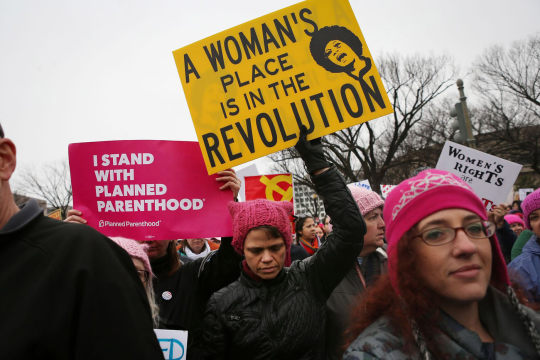
…or in the revolution? Can we have it both ways?
Are there other ways that we can think about how to respond to the threat that a judge like Kavanaugh poses to our bodies and communities?
As anarchists, we reject the idea that judges or politicians deserve the authority to determine the course of our lives. Rather than only trying to pressure leaders to vote one way or the other in a winner-take-all system that reduces us to spectators in the decisions that affect us, we propose solutions based in direct action: taking power back into our hands by enacting our needs and solving our problems ourselves, without representatives.
As long as legislators and judges can determine the scope of our reproductive options, our bodies and lives will be subject to the shifting winds of politics rather than our own immediate needs and values. Instead of validating their authority by limiting ourselves to calling for better legislators and judges, we should organize to secure and defend the means to make decisions regarding what we do with our bodies regardless of what courts or legislators decree.
In practice, this could mean networking with health workers who have the necessary skills, and sharing them widely; stockpiling and manufacturing the supplies we need for all sorts of health care; defending spaces where we can operate our own clinics; fundraising resources to secure access to health care and birth control options for all, regardless of ability to pay; and developing models for reproductive autonomy that draw on past precedents but address our current problems. We can do our best to render the decisions of would-be patriarchs like Kavanaugh irrelevant.
All this has already happened before. For example, from the late 1960s to the early 1970s, the Jane network, a vast clandestine effort centered in Chicago, provided illegal abortions to thousands of women. The fact that abortion was already accessible to so many women was a major factor in compelling the US court system to finally legalize abortion access in order to be able to regulate it. The most effective way to pressure the authorities to permit us access to the resources and care that we need is to present them with a fait accompli. Unfortunately, when it comes to standing up to elites like the Supreme Court and the police who enforce its decisions, there are no shortcuts.
We can extend the logic of direct action to every area in which a right-wing Supreme Court might inflict harm, from environmental destruction to indigenous sovereignty to labor organizing. All of the rights we have today are derived from the grassroots struggles of ordinary people who came before us, not from the wisdom or generosity of powerful officials.
FBI investigations and court processes will not end sexual violence or bring healing to survivors. To strike at the root causes that enable the Kavanaughs of the world to do harm, we have to tear up patriarchy and toxic masculinity by the roots. This involves a process of ongoing education around sexuality, consent, and relationships, developing strategies to intervene when we see violence of any kind in our communities, creating culture that models alternative visions of gender and intimacy, and reimagining justice as restorative and transformative rather than adversarial.
We can see how pervasive the problem is when we look at the narratives that underpin support for Kavanaugh. Leading up to the hearings, supporters focused on portraying Kavanaugh as a devoted family man. As multiple allegations of sexual assault surfaced, many commentators framed the question as a contradiction between Kavanaugh the loving husband and father and Kavanaugh the callous rapist, implying that these roles are mutually exclusive. Yet gendered violence continues at epidemic levels within proper heterosexual families; shocking rates of spousal rape and domestic violence permeate American marriages, while statistics on child sexual abuse indicate that family members make up a substantial proportion of abusers. Bill Cosby, the archetypical television husband and father, was recently sentenced to prison for drugging and sexually assaulting numerous women. The false assumption that a history of sexual assault is somehow incompatible with adhering to the conventions of heterosexual family life reflects the persistence of patriarchal norms and homophobia, as well as a refusal to honestly address the extent of gendered violence in our society.
No Supreme Court could solve this problem, even if it consisted of the nine wisest and gentlest people in the world. When it comes to social change, there’s no substitute for widespread grassroots action.
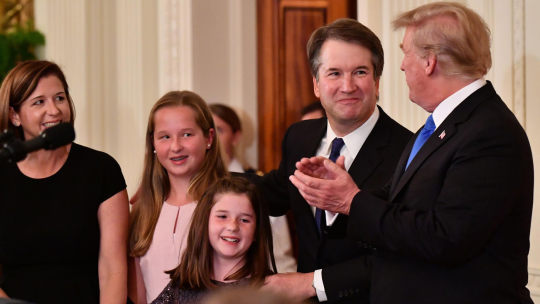
Family men and rapists are not mutually exclusive.
Some American feminists have drawn parallels between the Kavanaugh case and the #NotHim movement in Brazil, in which women are rallying against a Trump-esque misogynist politician running for president.
The struggle of Brazilian feminists to resist the extreme-right threat deserves our attention and support. Yet as anarchists, we can take that model further in responding to the Kavanaugh nomination. Rather than Not Him, we can assert Not Anyone—no man, rapist or not, deserves the power to decide the reproductive options for millions of women and others. Perhaps the more appropriate slogan for the struggle against patriarchy and the Supreme Court would be the rallying cry of Argentina’s 2002 rebellion: “Que se vayan todos!”—get rid of all of them. They all must go.
The sooner we can do this—the more we can delegitimize the authority of Supreme Courts to shape our lives, and the more powerful and creative we can make our our alternatives—the less we will have to fear from the Trumps and Kavanaughs of the world. Let’s build a society that enables everyone to engage in genuine self-determination—in which no man can decide what all of us may do with our bodies—in which no state can take away our power to shape our future.
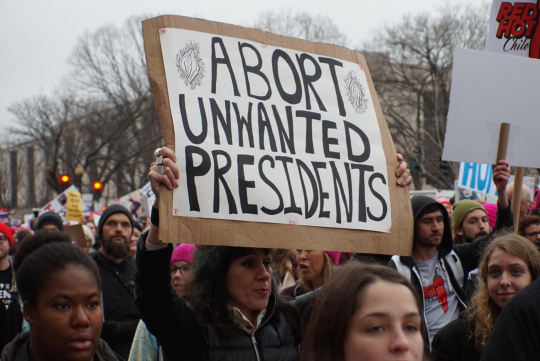
Further Reading
Fuck Abuse, Kill Power: Addressing the Root Causes of Sexual Harassment and Assault
26 notes
·
View notes
Text
The Lovers Tarot Card.
This horseplay anti-sanctimony is just one of things that saves his biography of a disorderly, terrible, ex-homeless man called Stuart Shorter from sentimentality. Allow's state you invest 10 hours each day either at the workplace, commuting to function, or doing jobs related to work. In the introductory phase, which generally takes place over the first 3 sessions, the key goals are to establish a strong therapeutic partnership, obtain a background of the customer's social partnerships, offer psychoeducation about the version of complicated sorrow, and also define the aspects of treatment. He did not ask for a reply; actually, he asked me to withhold my solution until I must be able to see him in person. He played Russell in Pals in 1999, showing up in the episodes The One Where Ross Hugs Rachel as well as The One Where Joey Loses His Insurance. And when one partner has Asperger's syndrome, the relationship could be even more of a challenge. Hilton Head lay on one side & the naval vessels on the various other; all that was bare & raw in the reduced structures of the new negotiation softened right into picturesqueness by the very early light. This is a minor instance, yet as a whole, stabbing in the back one's guarantees makes a manager appear unclear and also amateur. Your companion's worries of adultery could be put to rest if you enable her to hang out with your pal to understand that you typically aren't literally brought in to one another. Intergalactic Experience throughout numerous worlds - In the main tale setting you take a trip across the globe and right into area as you fight your method to the final experience with Boss 101. Its principles are dated now, yet the truth is the connection between business and customer has actually progressed and also can evolve even more. Leo tends to glamorize whatever (believe Joey Tribbiani from Buddies) as well as wants to be the center of attention. He wants to make whatever backdoor political offers could obtain him closer to Washington; he is as ready to take the situations of servant owners as he is to protect escaped servants; and he will certainly abandon his buddy in order to keep peace at house with his wife. However, changes in partners' perceptions of actor's responsiveness led to their increased responsiveness to actors and compassionate goals the following week. He or she appeared similar and also relatively cool to me so I supplied to buddy them on Facebook to get to understand them. Prior to The U.S.A.'s royal couple - Kim Kardashian as well as Kanye West - joined, also Kardashian spurted to journalism, I get to marry my buddy." Forget looking for your soul mate: weding your best friend is the new marital perfect. Show your manager just how much you appreciate him with a fancy bow like these from Jack Spade! If Scott and Rachel had actually just connected just what they were feeling, Rachel would certainly not have felt neglected nor needed a virtual friend to confide in, and Scott would certainly not have needed to create Alicia. What Employer later uncovered was that her Rockefeller other half was in fact an impostor '" a German nationwide named Christian Karl Gerhartsreiter, who district attorneys implicate of killing the grown-up child of his landlady while he lived in San Marino in the mid-1980s. Seoul main district court on Thursday accepted a prosecutors' request to provide a warrant to arrest Choi for claimed misuse of authority and also scams, according to court spokesperson Shin Jae-hwan. For some people, this actors of mind persists highly as well as consciously into their adult years. Consider http://buyitdirect-my.com/titan-gel-harga-yang-sah-kesan-bahan-bahan-alami-membeli-di-amazon-atau-di-farmasi/ or responses as details - take it or leave it. However do not hit the other person over the head with it. No significant partnership was located between isolation as well as sociability; depression and also sociability. Anxiety and isolation are thought about to be the significant problems resulting in impaired quality of life amongst elderly persons. The rest of the actors are either irritating by their very own efforts or disappointing as a result of just how little they offer the table. It's so much easier to keep something like that on track if you do not just consult when you have actually got to situation factor," she said. If not, remark listed below and also I will try to gather some details concepts just for your boss. It is only suitable that throughout this dynamic autonomous procedure, there exists in our city a cross-section of representation of the voices of America-- liberal, modest, conventional, as well as radical, young and old, hawk and also dove, hippy as well as square ... and this is the means it ought to be since this is America. Tell him regarding it the following time he informs you in the nick of time that he has actually made a plan with his buddies. The motivation and also social abilities acquired via a strong network of buddies instructs young people how to act in social scenarios, which establishes them up well for adulthood. Stabilizing sex and soul, Like A Boss highlights the feelings of the heart versus the logic of the head. The partnership between doctors as well as their individuals has gotten philosophical, sociological, and also literary focus since Hippocrates, and also is the topic of some 8,000 posts, essays, phases, and books in the modern-day medical literary works. On November 25th partnerships as well as connections are highlighted as well as this is a time to end a connection or partnership or even to start brand-new. As soon as you've passed along the return to and also spoken to your friend concerning logistics, it's out of your hands. Maybe you are criticizing your buddy for the damaged friendship, when you are in fact equally to accountable. Handling up is essential so your boss knows the contribution you make in the organization. My ideal evening is ... to head out to supper with my pals and afterwards fly with them to Hawaii. Although the city invested $500,000 to beautify the area around the convention site, it could not conceal the fact that the city framed the amphitheater in barbed cable. This is wrong, as he is mosting likely to have the impression that you are aiming to require on your own back into the partnership. The top quality of the partnership will normally boost with age, so hang in there! Inquire, 'Can we locate a different means of working together?' or 'Exactly what do I have to transform?' or state 'When you do this, it makes me really feel really underestimated.'" The point right here is, that you make it regarding just how you feel and what you do. You do not call your manager out and state, Why are you such a w-er?" as this will result in confrontation. The connection in between the lead characters never ever seemed to establish from its superficial, sex-related beginnings.
1 note
·
View note
Note
See, I don’t think that fits with his character. The real tragedy of Robert is that he could have been all sorts of good things, he just can’t be bothered. He knows right from wrong, it’s just that doing the right thing can be too hard for him to bother.
While I think Tywin was mostly full of shit in his explanation of the situation with regard to Elia Martell & family, he was right in his assessment of Robert. Not that killing the kids was the right thing to do, but that doing the right thing with regard to them and their claims was going to be hard, complicated and require on-going vigilance and Robert did not want to worry about it. Also, Robert did see himself as the avenging hero. He says himself that the Rebellion was the most fun he ever had. He wanted to keep hold of the illusion that it was a simple battle of good versus evil (another aspect of the tragedy - the Battle for the Dawn would have been right up his alley, as long as he had Ned & Stannis to do all the logistical planning, so he could concentrate on the fun part of war-time leadership), and that meant dehumanizing the enemy in his mind. That the majority of House Targaryen were actually young children or innocent and supposedly protected women, was an inconvenient complication to the very real point that Aerys and Rhaegar were unfit to rule and deserved their fates by their own actions, and the war against them arguably justified. With the kids dead, and the remaining similarly inconvenient Targaryens holed up in Dragonstone, Robert wants to just move on and not deal with the implications of what might be “necessary” for him to take and rule the kingdom, so when Ned calls out the deaths and wants to confront the perpetrators, Robert doubles down. Calling Rhaegar’s children dragonspawn is Robert’s attempt to suppress his own conscience and deny Ned’s assertion, because he knows it was wrong.
The thing is, 15 years later, Robert is engaged in self-destructive behavior, and is almost completely checked out with regard to ruling his kingdom. The only things he seems to care about, beyond eating, drinking and screwing himself to death, is bringing Ned back into his life and destroying the last remnants of the Targaryens. This is a guy who wants to get back to his youth, and wants to change something in his life without actually doing much personally. He goes all the way to Winterfell, because it feels like doing something major, but he’s just going on a trip to recruit a single official. He’s a king doing a royal progress, he should be looking into matters that Ned brings up when he arrives, but all he really seems to care about is bring Ned back to court and enjoying himself, with feasting and hunting. As far as Tyrion & Jon see on the Wall, Ned’s efforts to get Robert to understand their problems might as well never happened. Robert is totally checked out. He is only interested in his friendship with Ned, he is yearning for Lyanna, but putting her on a pedestal too, suggesting what he really wants is not Lyanna in particular, but anything other than what he has. Either he wants to be Ned’s brother-in-law or else having Ned around is the best substitute for whatever Lyanna really represents to him.
The one exception to Robert’s disengagement (beyond wanting more Starks in his life) is killing Daenerys. This is the guy who pardoned Balon Greyjoy, and Lords Grandison, Fell & Cafferen after they rebelled against him, and welcomed them back into his regime. The Tyrells besieged his home for months, and now he’s hyping Loras Tyrell as his favorite new jousting prospect. But he really wants Dany dead, especially after learning that she is pregnant, despite Ned’s logical breakdown of the implausibility of the threat, compared to the moral lapse. And the most honest and honorable man in the room after Ned also agrees. And when Ned resigns and leaves, the complaint Robert is cited as making is his ingratitude. Like, bro, it’s really clear Ned has lines and you crossed them. But Robert cares more about the rejection of what he offered Ned, than the defiance or refusal to serve, or the blindness to a threat to the realm. Almost like the threat to his regime is not Robert’s priority here, and maybe what he really wants is to make Ned complicit in the crimes Robert allowed to stand 15 years ago and which almost ended their friendship.
I think all this points to the deaths of the “dragonspawn” poisoning Robert’s enjoyment of his victory. On his wedding night, when he believed he was about to have sex with a 17 year old virgin, he got too drunk to remember her identity. Maybe he wanted to be on the right side, on the Stark side, of the moral divide and was in denial about finding himself in bed with a Lannister. But even if we put it down to him simply being an inconsiderate ass, I can still see that divide as something that is bothering Robert after 15 years, even if he won’t let himself think about it. It could be a part of why he hates Cersei, why he publically leaves her and “their” children standing around, to go visit Lyanna’s tomb, why he wants to bring Ned to his court, constantly complains about Cersei to him, laughs publicly at Lannister humiliations and the notoriously not-empathetic Cersei believes recruiting Ned is indicative of a dissatisfaction with her and associates it with replacing her, why Robert’s brother, despite seeing him willing to hook up with anything female over the years, seems to really be hoping his own candidate for Cersei’s replacement will remind Robert of Lyanna. And why Robert seems to be baiting Ned at times with the Lannisters. “I’m still right, Ned, you’re still wrong, look how much I like the Lannisters, maybe I’ll give them more power, even despite your opinions of that thing back then. By the way, I hate Cersei.”
So he lets Jon Arryn talk him out of killing Viserys and Dany, because it really looks like they are gone for good, and he doesn’t want to repeat his sin, but also does not want to admit he was wrong to accept Tywin’s gift, so he pretends like killing them is a good idea and only his soft spot for Jon is allowing him to give up. The only other time we see Robert persuaded out of something is when Ned & Barristan confront him with the reality that he is no longer able to compete in a melee, because of both his physical degeneration and his royal status. Which isn’t really persuading, just pointing out that he’s not going to achieve what he wants by doing what they don’t want him to. Robert flatly admits he rarely listened to Jon. Ned & Varys reflect that forbidding Robert is a good way to get him to try to do it. So I don’t think Jon persuaded Robert on any sort of ethical or practical grounds, I think he just gave Robert an excuse to call off the hunt without admitting it’s wrong, or backing down from his dragonspawn position, and allowing him to keep grumbling about not being able to kill Viserys & Dany, because it’s totally the right thing to do and perfectly justified.
And while Robert refuses to listen to any further arguments about killing Dany after Ned’s resignation is unaccepted, but brings it up himself to call off the assassination, even while handing Ned the power of the crown and probably knowing that he’ll undo it himself anyway. He’s trying to do the right thing while he still has time. He doesn’t know what’s going to happen when he dies shortly, but it looks a lot like sleep, and in his final rest, he does not want to repeat the nightmares he has suffered over Dany’s niece and nephew.
Do you think Robert Baratheon was actually haunted by the memory of Elia’s children in the Lannister red cloaks, in the same way Ned Stark and Thoros of Myr were?
"I see no babes, only dragonspawn," sounds like a firm no.
-SLAL
14 notes
·
View notes